

Post Your DQs etc Forms of Narrative Fall 2022 here.
Please post your DQs under each date by 8:00 p.m. the date they are due. Each Monday and Wednesday, I’ll save the DQs at 8:00 p.m. and send them out to you on the listserv.
A Flock Of Seagulls - Space Age Love Song (With the Prague Philharmonic Orchestra)
A Flock Of Seagulls - Space Age Love Song (Official Music Video)
"A la recherche du temps perdu" Kees Van Dongen
The French use THE PRESENT PERFECT SIMPLE TENSE for unfinished and finished actions.
TENTATIVE SCHEDULE (Please expect minor adjustments to be made in the schedule from time to time; all changes will be announced both in class and on the listserv. Don't hesitate to ask me if you have a question.)
AUGUST 25: Reading Yourself to Sleep
Proust and Genette First Day of Class / Resources / Translations
Rather than read the assigned pages, you may LISTEN to them being read by John Rowe on Audible.com. Rowe does an excellent job, imo, of dramatizing the novel. There is a less interesting and less entertaining audiorecording, imo,that comes with a Kindle edition.

Due Monday August 29 by 8:00 p.m: Read Marcel Proust, Swann's Way, Lydia Davis, Penguin, 2005, pp. 1-48. Write two Discussion Questions (DQs) focused on something you noticed about Proust's writing style, and look up three BIG WORDS (words you didn't know when you encountered them during your reading) and their definitions. Don't forget to put your name in the upper right corner of your word document. Post Your DQs etc Forms of Narrative Fall 2022 here. If you want to know how to improve your discussion questions, I will be happy to meet with you on zoom during office hours or by appointment and show you.
THE READING IS NOT A PROMPT. IT IS THE OBJECT OF YOUR CRITICAL ATTENTION. YOU ARE TRYING TO EXPLAIN IT TO YOURSELF.
Example of the document format:
Your name in the upper right corner
1. (Give the page number(s) or quote enough of the text for us to be able to find the passage you are discussing)
2. (Give the page number(s) or quote enough of the text for us to be able to find the passage you are discussing)
Three Big Words (on each assigned reading)
a. Write down the word and give the definition. Cut and paste the sentence where the word is used.
NO KNOWLEDGE OF FRENCH IS REQUIRED FOR THIS COURSE.
What are you going to be Reading or Hearing for your first assignment? The experience described so well by Proust's first critic is, I believe, universal even the critic's judgment is bad. Everyone has a version of that critic's reading experience. Lots of people, including me, just think reading the Recherche is a great experience, even if there are slow (even occasionally boring) parts.
AUGUST 30 the magic lantern (p. 9); Golo and Geneviève de Brabant (26) ; Charles Swann comes for dinner; Marcel has to to sleep without a kiss from his mother (27-3); parents on the staircase; Swann has aged, 34; father lets the narrator's mother come kiss Marcel goodnight and sleep on a second bed in the same room (36-38); the mother reads one of the books the grandmother had bought him (39-43); this book will reappear near the end of the library scene in Time Found Again; petites Madeleines episode (43-48)
REQUIRED READING:
1. Marcel Proust, Swann's Way, Lydia Davis, Penguin, 2005, pp. 1-48.

Marcel Proust, Swann's Way Trans. James Grieve Trans. (1982)
For information on what is a good discussion question, please go to this webpage: Discussion Questions (DQs)
Due Wednesday August 31 by 8:00 p.m: Swann's Way. Begin reading the first sentence--"Combray from a distance, for ten leagues' around . . . . -and stop reading when you get to "If Saturday, which began an hour earlier and deprived her of . . . ." (Lydia Davis, pp. 49-118); "Although Saturday, by beginning an hour earlier, and by depriving her of the services of Françoise . . . " (Moncrieff, Kilmartin, Enright translation, (Modern Library) pp. 65-160). Write two Discussion Questions (DQs) and look up three BIG WORDS (words you didn't know when you encountered them during your reading) and their definitions. Post Your DQs and Big Words in the google doc here. Don't forget to put your name in the upper right corner of your word document. If you want to know how to improve your discussion questions, I will be happy to meet with you on zoom during office hours or by appointment and show you.
Sign Up to Co-Lead Class the First of at Least Two Times During the Semester
Once you have a partner to co-lead class discussion, the two of you will create a google doc for your notes and share it with me by 5:00 p.m. the day before you are co-leading so I can add my thoughts. Make sure you give me permission to edit the google document. Don't co-lead class with the same partner more than once.
SEPTEMBER 1:
REQUIRED READING:
Swann's Way, "Combray" or "Combray 2," depending on the translation you have chosen to read.
Begin reading the first sentence--"Combray from a distance, for ten leagues' around . . . . -and stop reading when you get to "If Saturday, which began an hour earlier and deprived her of . . . ." (Lydia Davis, pp. 49-118); "Although Saturday, by beginning an hour earlier, and by depriving her of the services of Françoise . . . " (Moncrieff, Kilmartin, Enright translation, (Modern Library) pp. 65-160)
May I suggest that you read the Moncrieff, Kilmartin, Enright translation (Modern Library) of this part of Combray (2)? It is arguably better at capturing the musicality of the novel than the more accurate translation by Lydia Davis. You may continue reading the Davis translation if you have already bought it. Or you may try William C. Carter's translation of Swann's Way, although is much more expensive than the other. The e-book for William C. Carter's translation of Swann's Way is available here.
Or you may read the original 1922 C. K. Scott Moncrieff translation for free on gutenberg.org.
Adam Gopnik makes a case for it here: "Why an Imperfect Version of Proust Is a Classic in English," March 30, 2015
Ebooks for the Modern Library and Viking / Penguin editions of Proust's novels may be found here.
Recommended Reading:
Proust's resumé for Swann's Way
For reference À la recherche du temps perdu (1919)


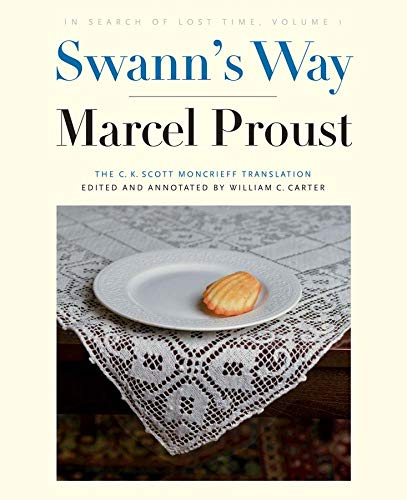
I will no longer post due dates for Discussion Questions (DQs) and BIG WORDS. They are due every Monday and Wednesday by 8:00 p.m. and address the readings for the Tuesday and Thursday that follow them. Post Your DQs etc Forms of Narrative Fall 2022 here.
SEPTEMBER 6: Aunt Leonie's death; Françoise's savage grief; "Giotto's Charity" gives birth; "scene of sadism"; Legrandin the snob; the narrator's desire to become a writer and fear he will fail; the steeples of Martinville; the Duchesse of Guermantes in the chapel; the water lilies
Note: Many characters are fractured, or split up into two: there are two Marcels, the young man and the narrator; also the narrator Marcel and Marcel Proust; two Swanns; two Legandins; two lesbians; and two Duchesses of Guermantes (In Finding Time Again: "There were two Baron Charlus.")
REQUIRED READING:
Swann's Way, "Combray" or "Combray 2"
Begin reading at-- "If Saturday, which began an hour earlier and deprived her of . . . ." (Lydia Davis, pp. 119-191); "Although Saturday, by beginning an hour earlier, and by depriving her of the services of Françoise . . . " (Montcrieff trans; Moncrieff, Kilmartin, Enright translation, (Modern Library) p. 160-264). Stop reading at the end of "Combray" or "Combray 2" (up to "Swann in Love")



SEPTEMBER 8 Proust's Palimpsest: M. Legrandin; the Steeple; the pink hawthorns
"Marcel becomes a writer."
--Genette's summary of the novel.
REQUIRED READING: (Write one DQ on each reading)
1. Gérard Genette, "Proust Palimpsest," in Figures of Literary Discourse, Translator Alan Sheridan; pp. 203-28.
2. Gérard Genette, "The Proustian Paratext," SubStance, Vol. 17, No. 2, Issue 56: Reading In and Around (1988), pp. 63-77.
Note: Genette begins his article by turning to the end of the Recherche. You can get a sense of how wonderfully responsive a reader Genette is, how carefully he makes his selections just by going to the endnotes and checking his citations of Proust's novel. Time Regained is cited twenty-two times. Swann's Way is cited eleven times. Guermantes Way is cited twice. Why? Because for Genette, the Proustian palimpsest is both intertextual and infratextual. It even includes Proust's earlier novel, chiefly, Jean Senteuil.
Recommended (not required reading):
Some of Proust's own thoughts about incompletion and art in the Recherche:
Proust on the incomplete work of art and the time of reading
"They thought athat one ought to present to children, and that children showed good taste in enjoying right from the start, those works of art which, once one has reached maturity, one will admire forever. The fact is they probably regarded aesthetic merit as material objects which an open eye could not help perceiving without one's needing to ripen equivalents of them slowly in one's heart."
--Combray 2
Gilles Deleuze, Proust and Signs
Proust's resumé for Finding Time Again
SEPTEMBER 13 The Goncourts' "journal," or pastiche; the library scene (discussed by Genette)
REQUIRED READING:
Time Regained (Modern Library, trans. Mayor, Andreas; Kilmartin, Terence; Enright, D. J., 1993),
pp. 26-46; 226-332
or
Finding Time Again (Penguin, trans. Ian Patterson 2003), 15-29; 162-226
For the Goncourts' "Journal," begin reading at "Here are the pages that I read before fatigue closed my eyes . . . . (Modern Library); ""Here are the pages that I read before tiredness closed my eyes . . . ." (Penguin) and stop reading at "These ideas, tending in some cases to diminish," . . . (Modern Library); "Thoughts like these, tending in some cases to diminish, . . ." (Pengun)
For the library scene, begin reading at "The new sanitorium to which I had retired" (Penguin) / "The new sanitorium to which I withdrew . . . (Modern Library) and stop reading "At that moment the butler came to tell me that. . . . (Penguin) / "At this moment, the butler came in to tell that . . . " (Modern Library).
Ebooks for both editions may be found here. They may be available for less by other online vendors. The Penguin translation is only available in paperback or harcover.
Note: In Time Regained, the narrator has three involuntary memories that recall the earlier involuntary memories of the madeleine dipped in tea: stumbling over some unevenly laid pavement stones; the sound of a spoon on a teacup; the stiffness of a napkin when he touches it to his face. Marcel Proust begins Finding Time Again with "a [slanting / oblique / level] ray of the setting sun" and ends with "we are no longer jealous of whom we no longer love."
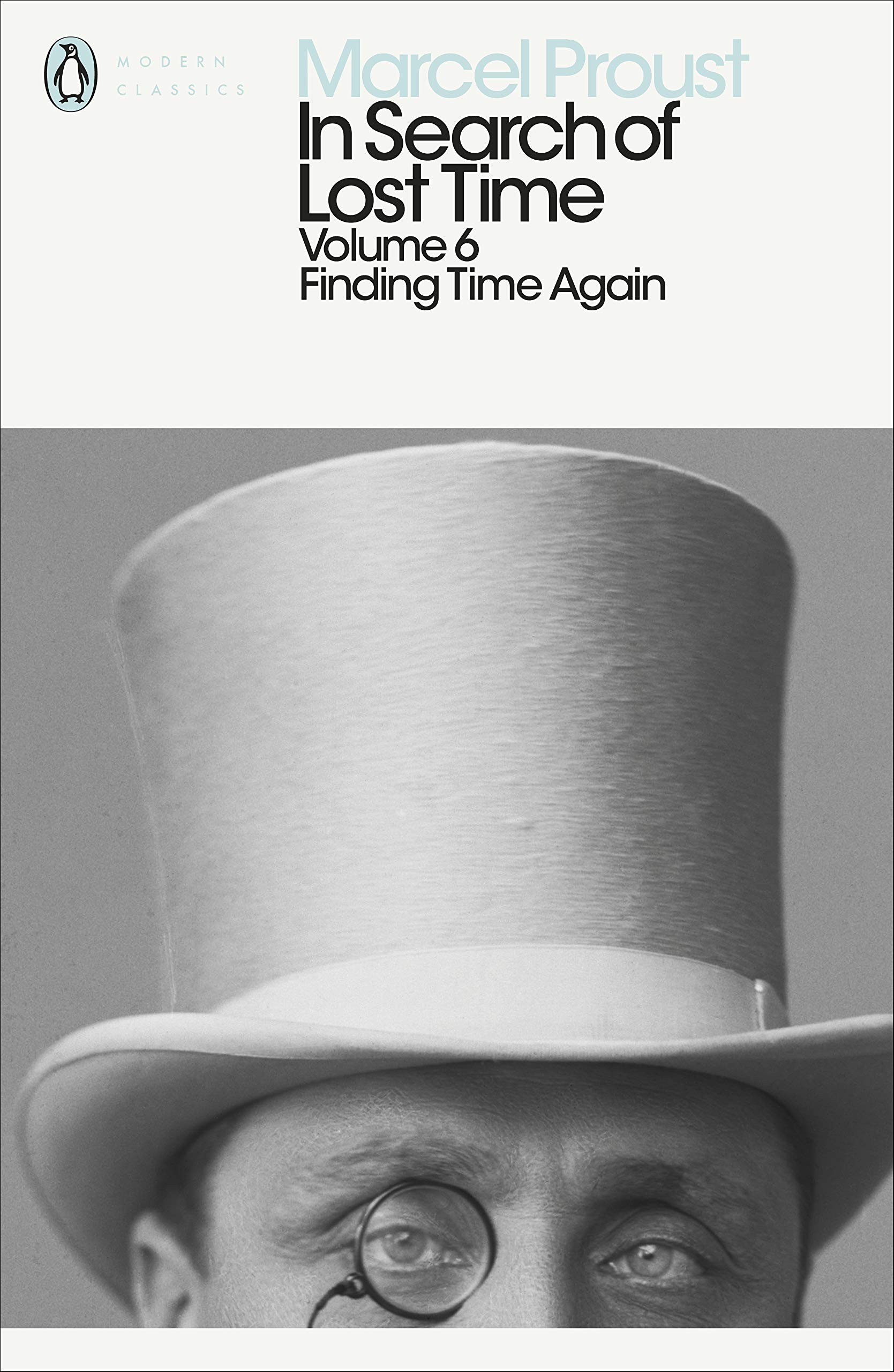
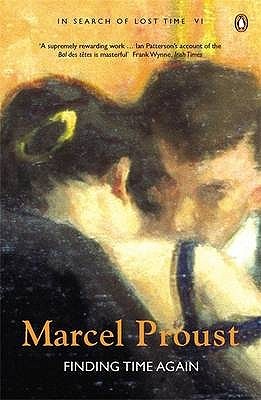
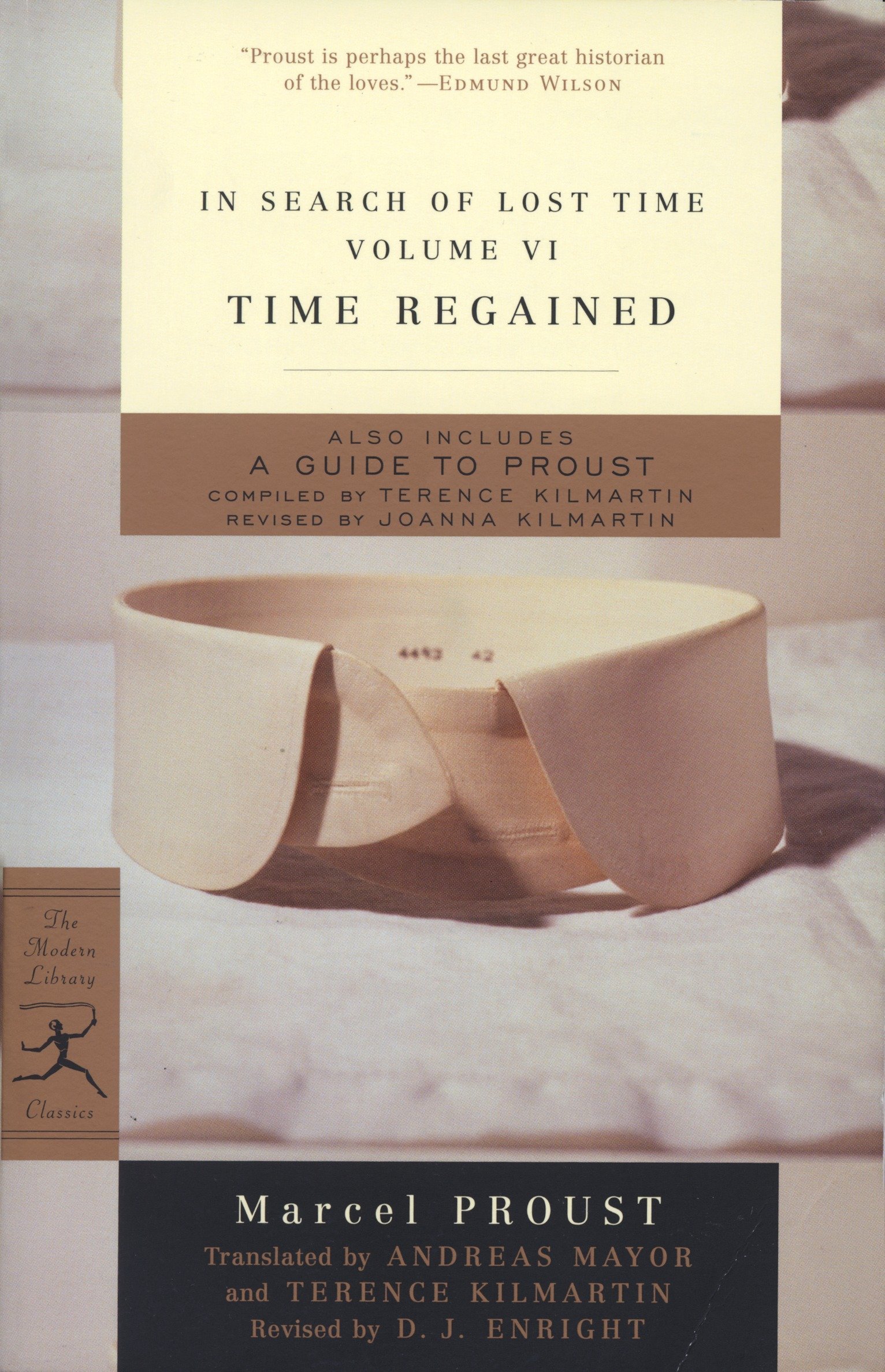
Ebooks for the Modern Library and Penguin editions may be found here. They may be available for less at other online vendors. Ebooks for both editions may be found here. They may be available for less at other online vendors. The Penguin translation is only available in paperback or hardcover.
Marcel Proust, The Past Recaptured, first trans. by Andreas Mayor because Montcrieff had died before getting to it; also translated later by Frederick A. Blossom in 1970.

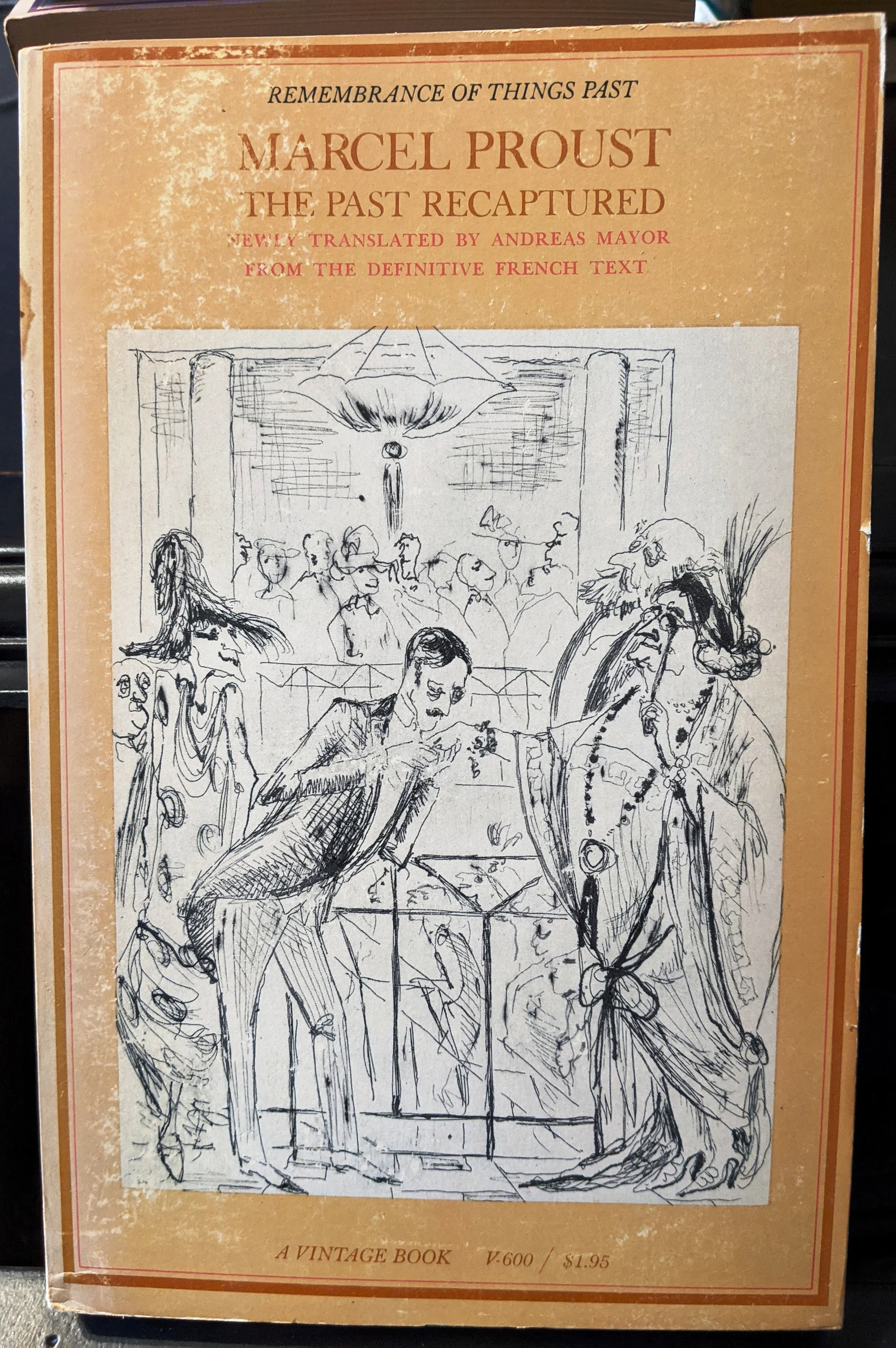
Then the Andreas Mayor translation was retitled Time Regained by Terence Kilmartin in 1981
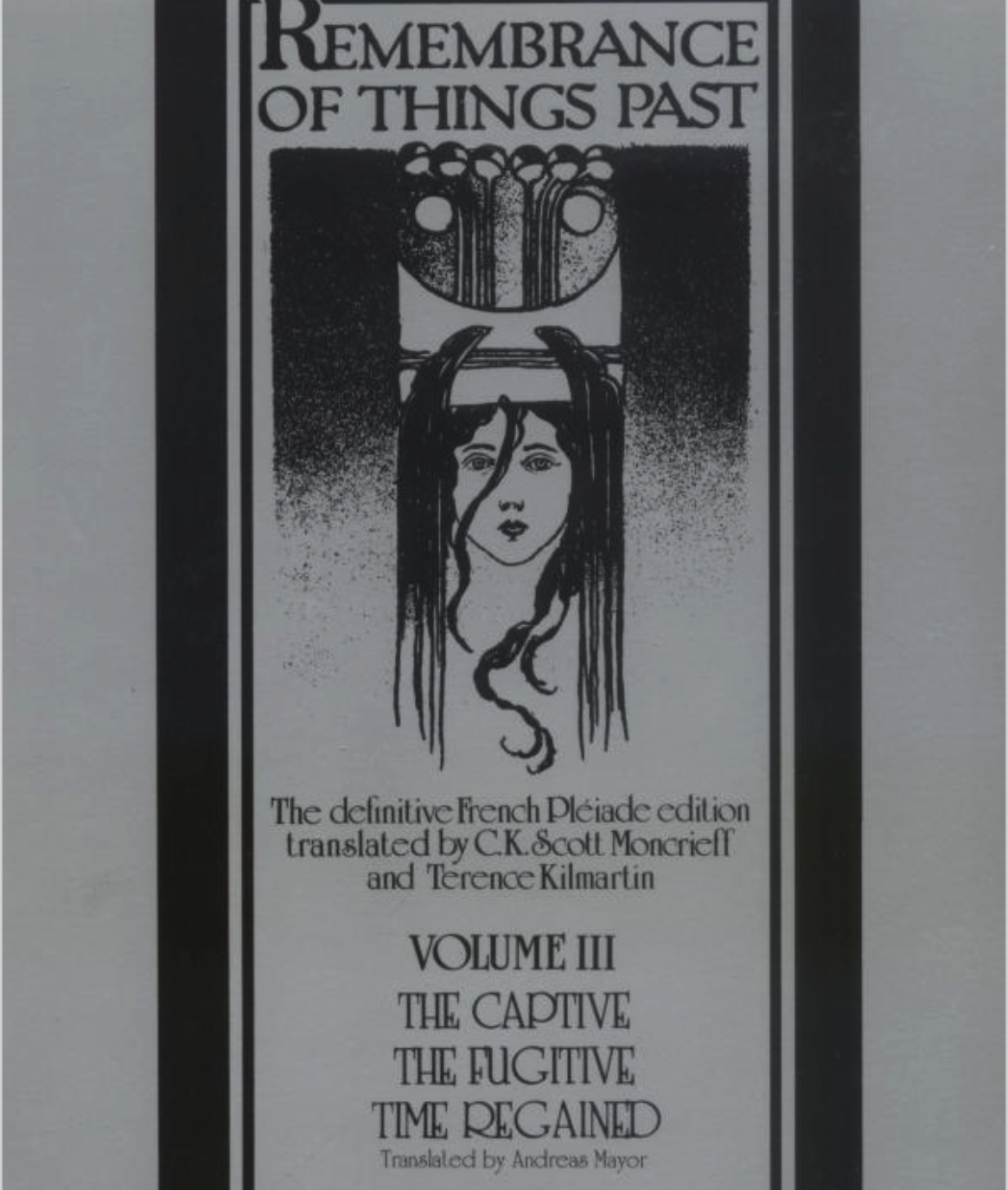
Then David Enright revised the Mayor translation and we have now the Modern Library edition.
SEPTEMBER 15 Time and Old Age: The matinée at the House of the Duchesse de Guermantes
REQUIRED READING:
Time Regained trans. Mayor, Andreas; Kilmartin, Terence; Enright, D. J. (Modern Library, 1993),
pp. 332-477
or
Finding Time Again trans. Ian Patterson (Penguin, 2003), pp. 226-322
Begin reading "At that moment the butler came to tell me that. . . . " (Penguin) "At this moment, the butler came in to tell me that . . . " (Modern Library) and stop reading at "The Duchesses's life, nevertheless, was very unhappy, . . . ." (Penguin) / (Modern Library)
Ebooks for the Modern Library and Penguin editions may be found here. They may be available for less at other online vendors. Ebooks for both editions may be found here. They may be available for less at other online vendors. The Penguin translation by Ian Patterson is only available in paperback or hardcover.
Recommended Reading:
Virtuoso sisters claim to have solved Proust’s musical puzzle
https://archive.org/details/marcelproustengl00newy



FIRST PAPER DUE SEPTEMBER 24 by 11:59 p.m. Email it to me at [email protected]
Reread Gérard Genette, "Proust Palimpsest," in Figures of Literary Discourse, Translator Alan Sheridan, 203-08; Gérard Genette, « Proust palimpseste », Figures I, Seuil, « Points », 1966: Key words: metaphor, time, duration, analogy, essences, vision. Genette focuses, without saying so, on part of the library scene (about twenty pages of it) set at the house of M. de Guermantes in Time Regained.
Key concepts of narratology: focalization / Genette, Gérard (1972). "Discours du récit." G. Genette. Figures III. Paris: Seuil, 67–282 / Narrative Discourse: An Essay on Method, pp. 189-94; Gérard Genette on narrative and discourse in "Boundaries of Narrative," Trans. Ann Levonas; New Literary History, Autumn, 1976, Vol. 8, No. 1, Readers and Spectators: Some Views and Reviews (Autumn, 1976), pp. 1-13; free indirect style / narrative voice: who is speaking? "Voice" in Narrative Discourse: An Essay on Method, pp. 212-62.
SEPTEMBER 20
REQUIRED READING:
Recommended Reading:
Leo Bersani, "Proust and the Art of Incompletion," in Balzac to Beckett (1970), pp. 192-239
SEPTEMBER 22
REQUIRED READING:
Paul de Man, "Reading (Proust)," in Allegories of Reading, pp. 59-78; note Paul de Man's criticism of Genette's essay in "Reading (Proust)," pp. 61-62, n. 5
Recommended Reading:
The pages of the Pleiades edition de Man cites in his essay.
And so it is with our own past. It is a labour in vain to attempt to recapture it: all the efforts of our intellect must prove futile. The past is hidden somewhere outside the realm, beyond the reach of intellect, in some material object (in the sensation which that material object will give us) which we do not suspect. And as for that object, it depends on chance whether we come upon it or not before we ourselves must die.
I would amuse myself by watching the glass jars which the boys used to lower into the Vivonne, to catch minnows, and which, filled by the current of the stream, in which they themselves also were enclosed, at once 'containers' whose transparent sides were like solidified water and 'contents' plunged into a still larger container of liquid, flowing crystal, suggested an image of coolness more delicious and more provoking than the same water in the same jars would have done, standing upon a table laid for dinner, by shewing it as perpetually in flight between the impalpable water, in which my hands could not arrest it, and the insoluble glass, in which my palate could not enjoy it. I decided that I would come there again with a line and catch fish; I begged for and obtained a morsel of bread from our luncheon basket; and threw into the Vivonne pellets which had the power, it seemed, to bring about a chemical precipitation, for the water at once grew solid round about them in oval clusters of emaciated tadpoles, which until then it had, no doubt, been holding in solution, invisible, but ready and alert to enter the stage of crystallisation.
--Swann's Way, trans. Montcrieff
No Writing Off the Writer, However Bad
Sainte-Beuve championed a form of biographical criticism that saw texts as morally and intellectually inseparable from their writers. Here is Sainte-Beuve. . . . Sainte-Beuve . . . rank[ed] Bernard, Vinet, Molé, Verdelin, Meilhan, and Azyr among the great writers of his time, . . . dismiss[ed] Baudelaire and Balzac as vulgar and Hugo as overly political. History has not been on Sainte-Beuve’s side, and neither was Proust. A la recherche, the novel that grew out of [Contre Sainte-Beuve] this early piece of literary criticism, persuasively refutes Sainte-Beuve’s method by bringing into contrast the sometimes sordid lives of its characters and the emotional nuance of their experiences of the world.
Marcel Proust, Contre Saint-Beuve
First Paper Due by 11:59 September 24. Topics to be announced. Email your paper to me at [email protected]
SEPTEMBER 27
REQUIRED READING:
"Swann in Love," pp. 195-251 (Davis)
Ebooks for the Modern Library and Penguin editions may be found here. They may be available for less at other online vendors. The e-book for William C. Carter's translation of Swann's Way is available here and no doubt from other vendors you can find if you google it.


SWANN’S WAY by Marcel Proust, trans. James Grieve (May, 2023)
SEPTEMBER 29: Good Signs
REQUIRED READING:
"Swann in Love" pp. 252-329 (Davis)
Begin with the sentence "And in fact she found Swann intellectually inferior to what she would have imagined" (Davis trans.); "With the result that she found Swann inferior, intellectually, to what she had supposed." Stop reading at ""Odette never gave him any information about these important things which have occupied her so fully . . . ." in "Swann in Love."
Ebooks for the Modern Library and Penguin editions may be found here. They may be available for less at other online vendors. The e-book for William C. Carter's translation of Swann's Way is available here and no doubt from other vendors you can find if you google it.


Recommended Reading:
André Aciman, Ed.The Proust Project (2004)
Vladimir Nabokov, "Marcel Proust: The Walk by Swann's Place," in Lectures on Literature, Ed. Fredson Bowers (1980) pp. 206-49.
Theodor W. Adorno, "Short Commentaries on Proust." in Notes to Literature, edited by Rolf Tiedemann, translated by S.W. Nicholsen, vol. 1. (Columbia University Press, 1991), pp. 174-184 (the pages on the lady in the pink).
"The smallest facts, the most trivial happenings, are only the outward signs of an idea which has to be elucidated and which often conceals other ideas, like a palimpsest."
--The Guermantes Way
OCTOBER 4: What counts as a digression in Proust? "To return to" marks explicitly the end of a digression; could parenthentical clauses reasonably be regarded as disgressions? Is the entire novel a digression? In his book, Proust and Digression, Pierre Bayard wonders if Swann in Love is not one big digression. But then one has to ask: what happens when Swann in Love is published as a stand alone?
Please post your DQs both on google docs and canvas. Thank you!
REQUIRED READING:
"Swann in Love," pp. 330-396. Begin reading at "Odette never gave him any information about these important things which have occupied her so fully . . . ." Stop reading at the end of "Swann in Love."


OCTOBER 6: Repetitions and Recalls
Sign Up to Co-lead a Second Time--or even a third time (if you have not already done so)
Please post your DQs both on google docs and canvas. Thank you!
REQUIRED READING:
Read all of the last part of Swann's Way, entitled: "Place Names: The Place." (It's on pp. 399-444 in the Davis paperback, but may be easily found in any edition using the title.)
Write two DQs, one on each of the two space breaks near the end of in "Place Names: The Place." These space breaks recall the space break near at the end of "Combray I" ("Overture"). That single break marks a gap in the time of narration, a shift into the petit madeleine episode, and hence serves to mark a kind of conclusion, short of an epilogue, as well. What narrative purpose(s) does each space breaks serve in "Place Names: The Place?" What is the effect of having two rather than one space break? (These are just questions to get you thinking so you can raise your own questions, not questions for you to answer.)
Space Break 1 (Norton edition, p. 387) begins: "I always had within reach of my hand a map of Paris which, because one . . ."(p. 429, print, Davis)
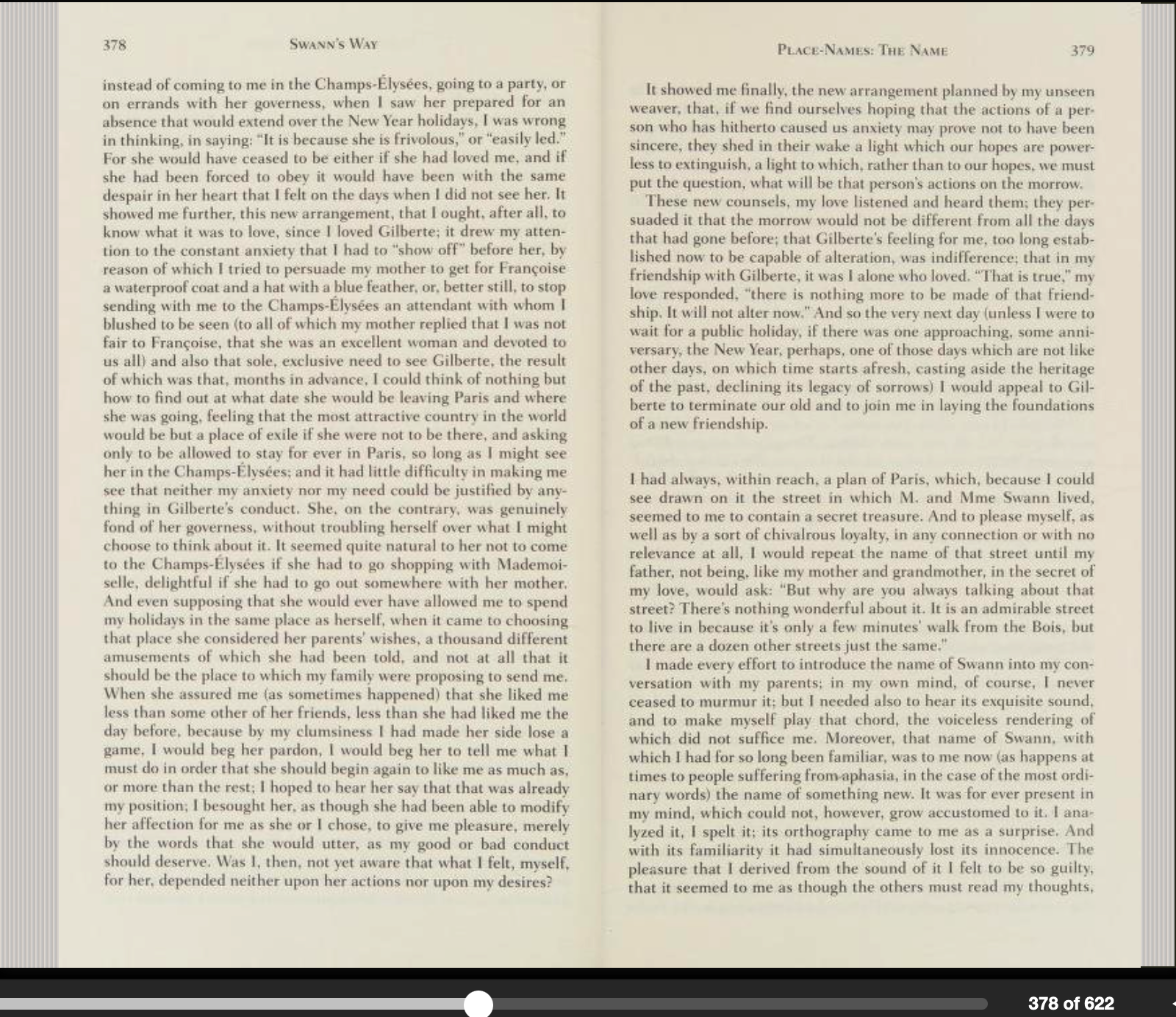
Space Break 2 (Norton edition, p. 378) begins "The sense of the complexity of the Bois de Boulogne makes it an artificial place, and in the zoological or . . . " (p. 438, print Davis)

Sign Up to Co-lead a Second Time--or even a third time (if you have not already done so)
OCTOBER 11
Please post your DQs both on google docs and canvas. Thank you!
REQUIRED READING:
Gérard Genette, "The Frontiers of Narrative," in Figures of Literary Discourse (narration and description; narrative and discourse), pp. 127-44
Sign Up to Co-lead a Second Time--or even a third time (if you have not already done so)
OCTOBER 13
Please post your DQs both on google docs and canvas. Thank you!
REQUIRED REREADING:
Gérard Genette, "Proust and Indirect Language," trans. Alan Sheridan in Figures of Literary Discourse, pp. 229-286.
Instead of writing DQs, outline the essay's main points. You may do it a rough way. So you can see that Genette is using quotations from characters to support his main points. I have given you the model for the outline and some examples I have quoted from the text here covering pages 229-236. Pay attention to paragraphing and space breaks.
I. First Main Point
A. Supporting Point
In spite of this diversity of value, some general laws do govern
the genesis and persistence of these linguistic errors. The first, and
most important, concerns an apparently universal desire, which
will be found at work elsewhere: motivate the sign. p. 232
The second law, which sterns from the first, explains not the
origin of the mistakes, but their resistance to all correction: the
persistence in error and the obstinate refusal of the ear to perceive
the "correct" form rejected by the mind. p. 233
C. Qualifying Point
However, the absolute imperfectibility that seems to be implied
by these laws is not quite without exception in the world of the
Recherche. p. 235
II Second Major Point
You may want to consult this translation but you may ignore it. "The Age of Names" trans. Thais Morgan in Mimologiques (the first two pages of each translation differ in substance)
Note: This is a long article. Be sure to take the time to read it--all of it. It is so BRILLIANT!!!!
OCTOBER 18
Please post your DQs on google docs and canvas. Thank you!
REQUIRED READING:
Gérard Genette, "Time and Narrative in À la Recherche du temps perdu." Aspects of Narrative: Selected Papers from the English Institute, edited by J. Hillis Miller, Trans. Paul de Man, Columbia University Press, 1971, pp. 93-118. De Man includes the French original in his translation. Note: this article includes the most important part of Narrative Discourse. (See below.) Genette responded to critics of that book in a later book, Narrative Discourse Revisited. Not quite content with that revisitation, he rewrote the first book and published it as Fiction and Diction.
Recommended reading:
Gérard Genette, Narrative Discourse An Essay on Method Trans. Jane E. Lewin Foreword by Jonathan Culler (CORNELL UNIVERSITY PRESS) digital facsimile / html, especially "The Game with Time" pp. 155-60 and Chapter Four: "Mood."
In French here.

OCTOBER 20
Please continue to post your DQs both on google docs and canvas for the rest of the semester. Thank you!
REQUIRED READING:
In the Shadow of Young Girls: "Part II: Place-Names: The Place," 221-91 (Grieve) Begin reading at "By the time my grandmother and I left Balbec." Stop reading at "As we drove down the other side of the rise, we would come upon . . . ."
The mother’s departure before the train leaves for Balbec, from the Gare Saint-Lazare, the grandmother on the train, the sunrise, the milkmaid, the lift, the bookcase in his hotel room, the hotel manager, the headwaiter, the dining room of the hotel looking at night like an aquarium with the faces of peasants pressed against the glass outside, Mlle de Stermaria, Mme de Villeparisis.
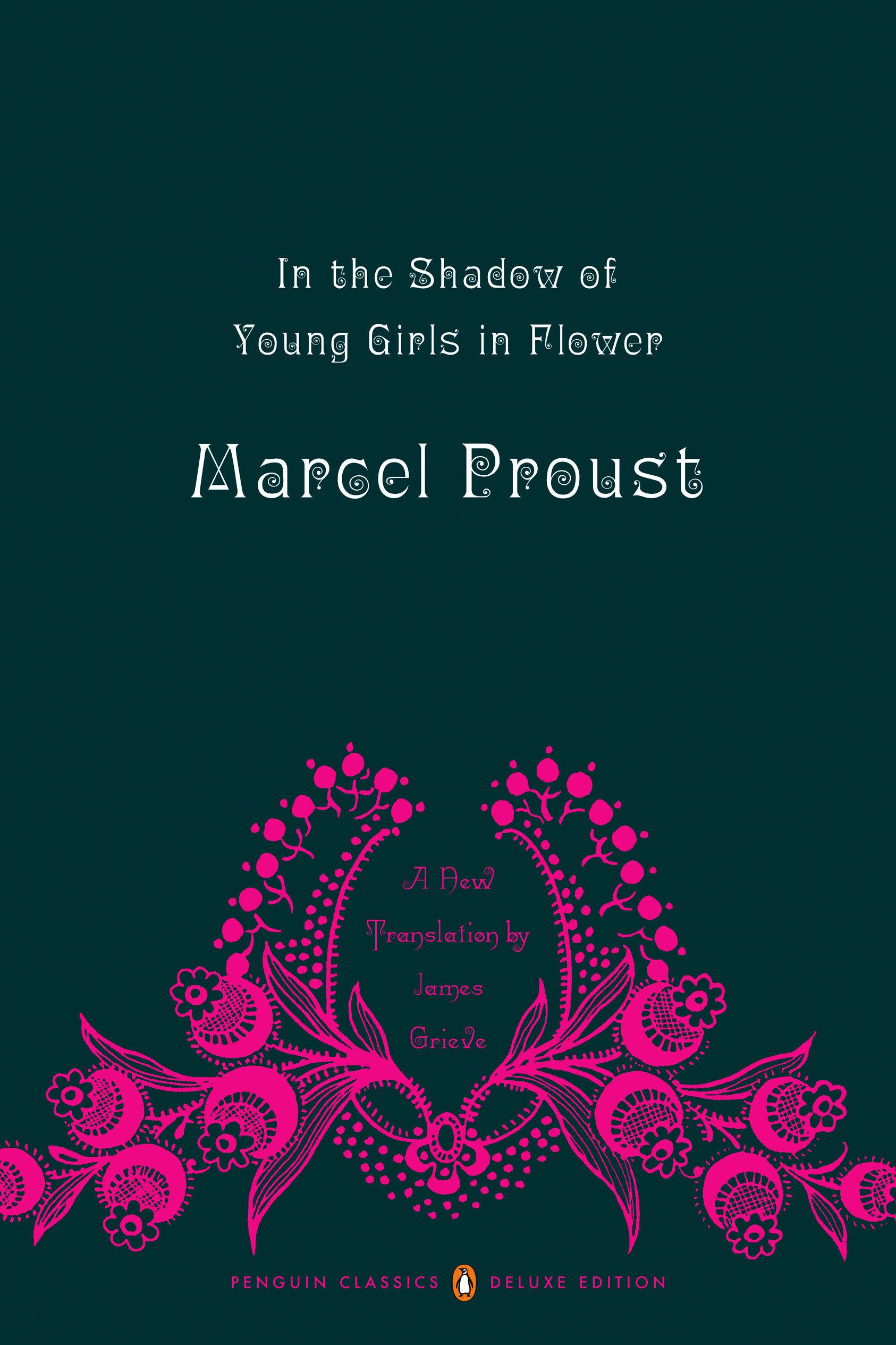
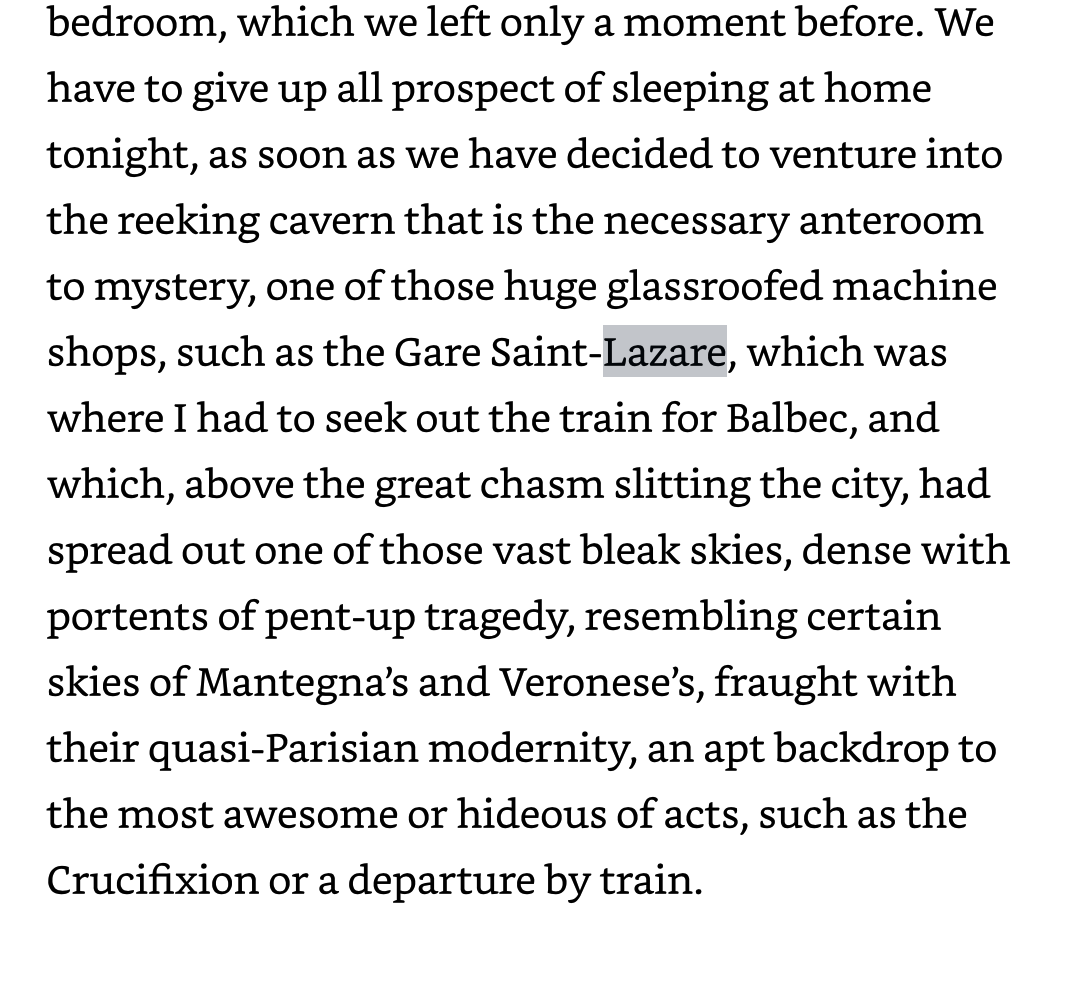
Claude monet-the-gare-saint-lazare/
Calvary. Crucifixion of Christ Paolo Veronese • Painting, 1582,
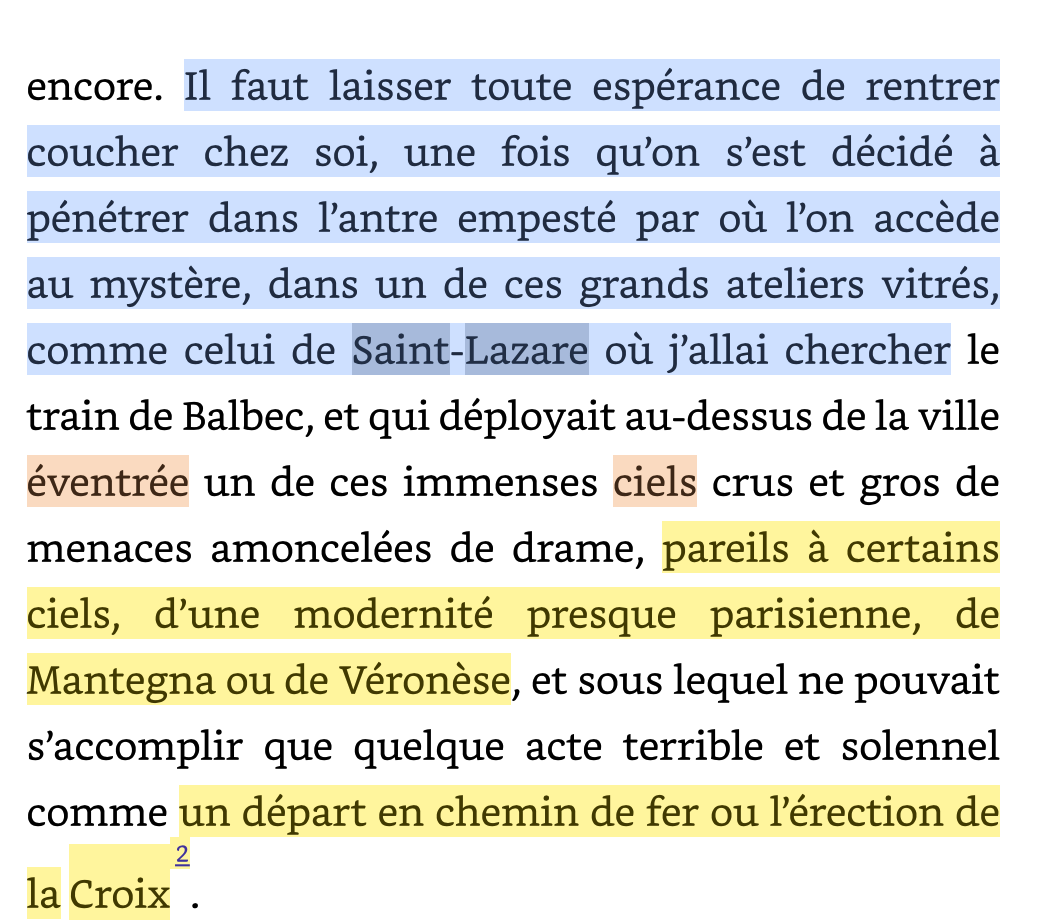
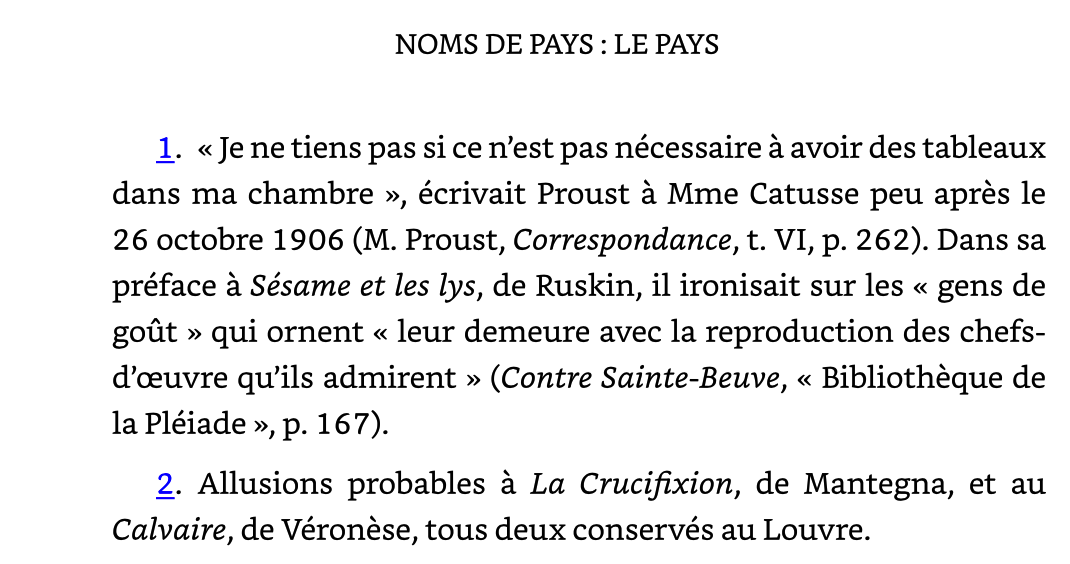 Great Hours of Anne of Brittany
Great Hours of Anne of Brittany
Horae ad usum Romanum, dites Grandes Heures d'Anne de Bretagne
OCTOBER 25
REQUIRED READING:
In the Shadow of Young Girls, 291-366 (Grieve) Begin reading at "As we drove down the other side of the rise, we would come upon . . . ." Stop reading at "However, when she made her entrance . . . ."

OCTOBER 27
REQUIRED READING:
In the Shadow of Young Girls, pp. 366-448 (Grieve) Begin reading at "However, when she made her entrance . . . ." Stop reading at "This letter, in its affectionateness, was really very reminiscent of those which, at a time. . . ."

Elstir's "Port de Carquethuit" is fictional, but the editors of the Pleiades (Gallimard) edition list the following paintings (n. 131) as possible sources:
James M. Turner, "Portsmouth seen from the sea. Fishermen in the wind" and "The Harbor of Dieppe" (1 and 2)
Claude Monet, Le Port de Honfleur
Edouard Manet, Le Depart du vapeur de Folkestone
Vittorio Carpaccio, The Legend of Sainte Ursule
NOVEMBER 1
REQUIRED READING:Vladimir Nabokov, "Marcel Proust: The Walk by Swann's Place," in Lectures on Literature, Ed. Fredson Bowers (1980) pp. 206-49.
Recommended Rereading:
Begin with "Elstir's studio seemed like the laboratory out of which would come . . . " p. 415
Finish with "The effort made by Elstir, when seeing reality, to rid himself of all the ideas . . ." p. 420 https://archive.org/details/inshadowofyoungg0000prou/page/414/mode/2up
"Pictures Worth Thousands of Words"
NOVEMBER 3
REQUIRED READING:
In the Shadow of Young Girls, pp. 448-533 (Grieve) Begin reading at "This letter, in its affectionateness, was really very reminiscent of those which, at a time. . . ." Stop reading after the last sentence of this novel. We'll have read all of Part II of In the Shadow of Young Girls.

Recommended Reading:
"Proust had a bad memory--as he had an inefficent habit, because he had an inefficent habit. The man with a good memory does not remember anything beause he does not forget anything. His memory is uniform, a creature of routine, at once a condition and function of his impeccable habit, an instrument of reference instead of an intrument of discovery." p. 17
--Samuel Beckett, Proust (1931)
For Beckett's analogy to the Leitmotiv and his incomplete list of Proust's fetishes, see pp. 22-24; on the greatest passage that Proust ever wrote--Les intermittences du coeur, see 25-30
Second Paper Due by 11:59 p.m. November 12. Topics to be announced. Email your paper for the course to me at [email protected].
NOVEMBER 8
REQUIRED READING:
Adorno, Theodor W. "Short Commentaries on Proust." Notes to Literature, edited by Rolf Tiedemann, translated by S.W. Nicholsen, vol. 1, Columbia University Press, 1991, pp. 174-184.
NOVEMBER 10
REQUIRED READING:
The Guermantes Way, Part I, pp. 30-52; 91-115; 126-35; 148-52; 166-77; 260-61 (lady in pink); 291- 306 (Traherne trans.)
Saint-Loup and Rachel; Rachel on stage and off; the pear tree orchard / Saint-Loup at Doncieres--the discussion of military strategy; death of Saint Loup in Time Regained

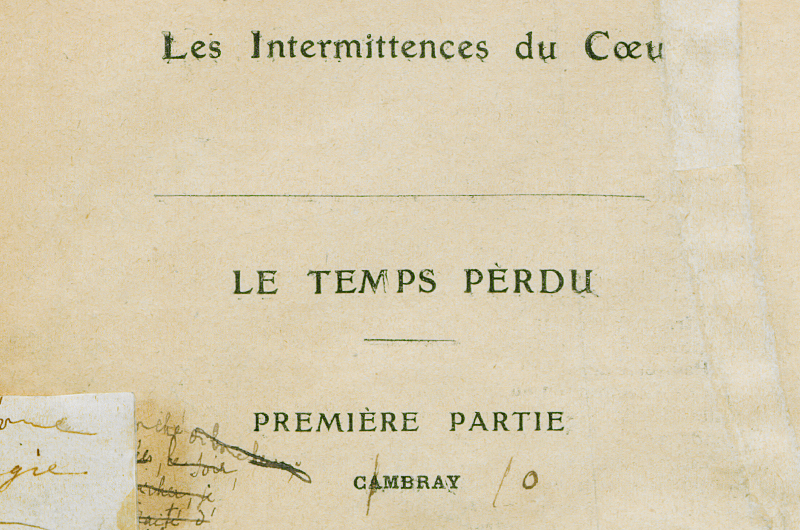
Second Paper Due by 11:59 p.m. November 12. Topics to be announced. Email your paper for the course to me at [email protected].
NOVEMBER 16
REQUIRED READING:
Part II: Chapter One (all of it; pp. 309-41 in Traherne trans); 575-94 (in Treharne trans.)
Part II: Chapter One is also known as Intermittences of the Heart
Recommended Reading:
390-402; 412-24; 428-58; 496-99; 514; 568-71
(Samuel Becket thought that this part is the heart of the entire Recherche. It was also the title Proust initally thought of using for the entire novel.)
Begin reading at ". . . ." Stop reading at ". . . ."Baron Charlus and Vaugobert at the Guermantes' party; Swann's arrival at the Duc de Guermantes' party; the missing hat; Swann ill at the end; the red shoes in The Guermantes Way. albertine's kiss 357-63

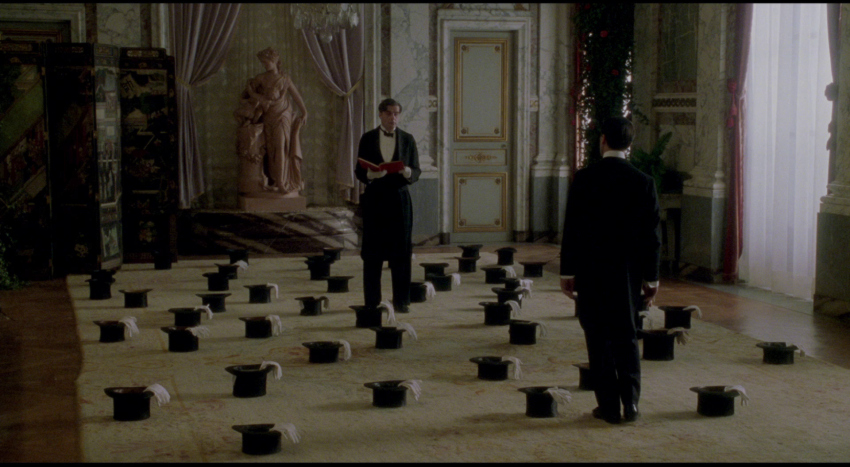
I was keeping an eye on my hat, among the crowd of hats that littered the carpet, and I asked myself with a vague curiosity to whom one of them could belong which was not that of the Due de Guermantes and yet in the lining of which a capital ‘G’ was surmounted by a ducal coronet. I knew who everyone in the room was, and could not think of anyone whose hat this could possibly be. . . .
Following a custom which was the fashion at that time, they laid their top hats on the floor beside them. The historian of the Fronde assumed they must be embarrassed, like peasants coming into the mayor’s office and not knowing what to do with their hats. … “No, no,” he said, “don’t leave them on the floor, they’ll be trodden on.” . . . . “No, it’s a new fashion with these young men to put their hats on the floor,” Mme de Villeparisis explained. “I’m like you. I can never get used to it. . . . . M. de Norpois, to give the impression he had just come in from the street and had not yet seen his hostess, had picked-up the first hat he found in the vestibule, one which I thought I recognized, and came forward to kiss Mme de Villeparisis’ hand. . . . . I took the opportunity to relieve him politely of the hat which he had felt obliged to bring ceremonially into the room, for I saw that it was my own which he had picked-up at random. . . . [I was] keeping an eye on my hat among all those that littered the carpet, and I wondered with a vague curiosity to whom could belong one that was not the Duc de Guermantes’ and yet in the lining of which a capital ‘G’ was surmounted by a ducal coronet. I knew who everyone in the room was and could not think of anyone whose hat this could possibly be. . . . . “You’d better take care, Monsieur,” I warned him. “You have picked-up the wrong hat by mistake.”
“Do you want to prevent me from taking my own hat?” assumed, a similar mishap having recently occurred to myself, that, someone else having taken his hat, he had seized upon one at random so as not to go home bare-headed and that I had placed him in a difficulty by exposing his stratagem. So I did not pursue the matter.” (II 287)
Have you got anything on the stocks?" M. de Norpois asked me with a
knowing air as he shook my hand warmly. I took the opportunity to
relieve him politely of the hat which he had felt obliged to bring
ceremonially into the room, for I saw that it was my own which he had
inadvertently taken my own.
NOVEMBER 18 Kinky Proust
REQUIRED READING:
Sodom and Gomorrah, Part I, pp. 1-33; 276-77 201-05 Part Two: Chapter 4 Intermettincies of the Heart II pp. 497-514. Begin reading at ". . . ." Stop reading at ". . . ."
The narrator observes Jupien and Baron Charlus meeting in the Guermantes's courtyard and going inside to have sex for half an hour and described through botanical metaphors. The entire passage is launched by the narrator's wish that an "unlikely insect would come, by a providential hazard, to visit the offered and neglected pistil.”
Beginning of Sodom and Gomorrah.
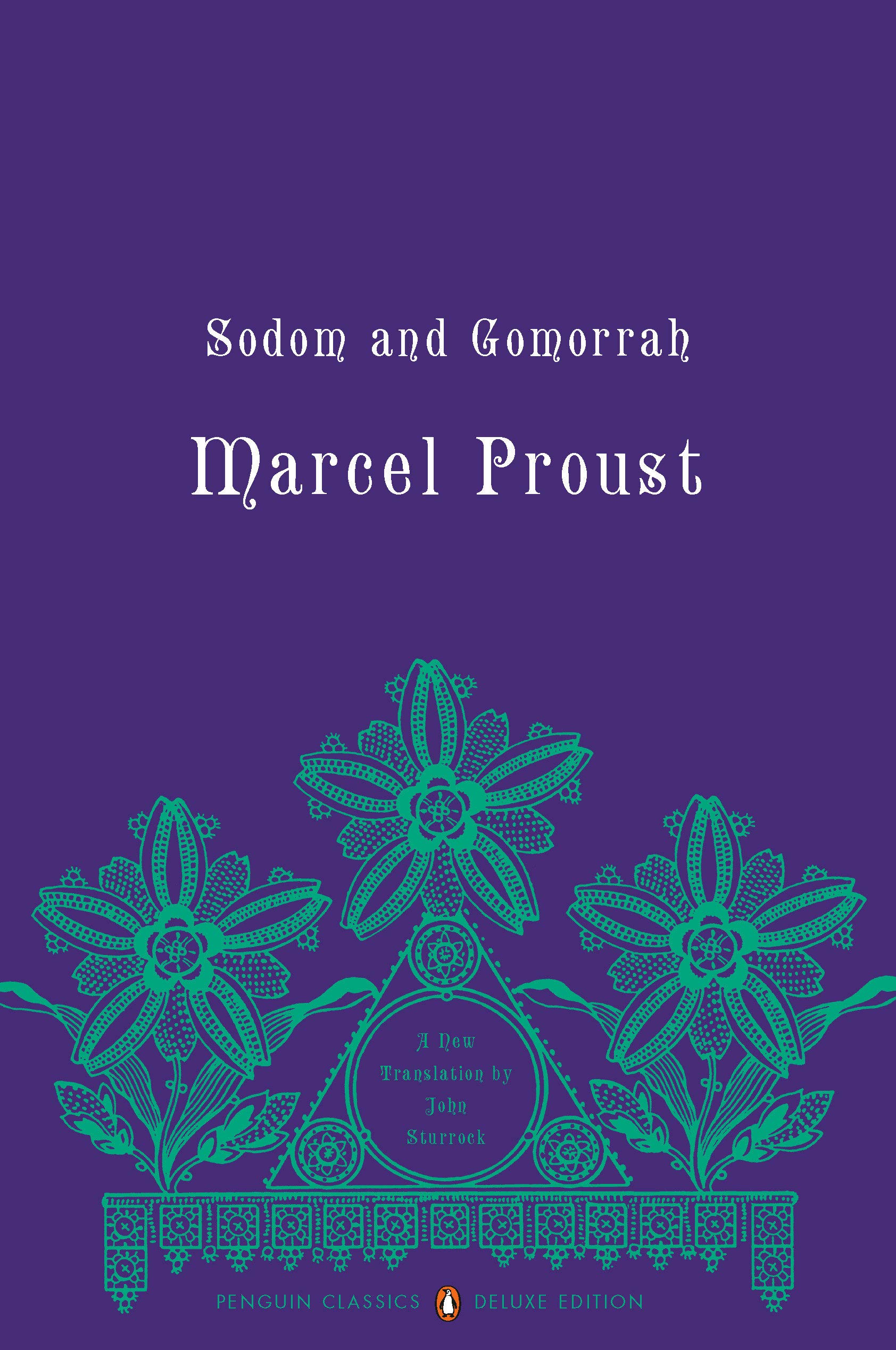
Recommended Reading:
Roland Barthes, "Longtemps, je me suis couche de bonne heure"
Roland Barthes, "Proust and Names"
Facing page French and English bi-lingual edition online.
NOVEMBER 22 The narrator mistakes a brothel for a bar and finds Jupien helping Baron Charlus be whipped by a male prostitute.
REQUIRED READING:
pp. tba Begin reading at ". . . ." Stop reading at ". . . ."
The Venteuil septet (returning to the "little phrase" in "Swann in Love") and Albertine

NOVEMBER 24
THANKSGIVING HOLIDAY
NOVEMBER 29
REQUIRED READING
The Fugitive, pp. tba; "Chapter Two: Madame de Forcheville," the narrator reading his own article in Le Figaro. pp. 162-90
Begin reading at ". . . ." Stop reading at ". . . ."
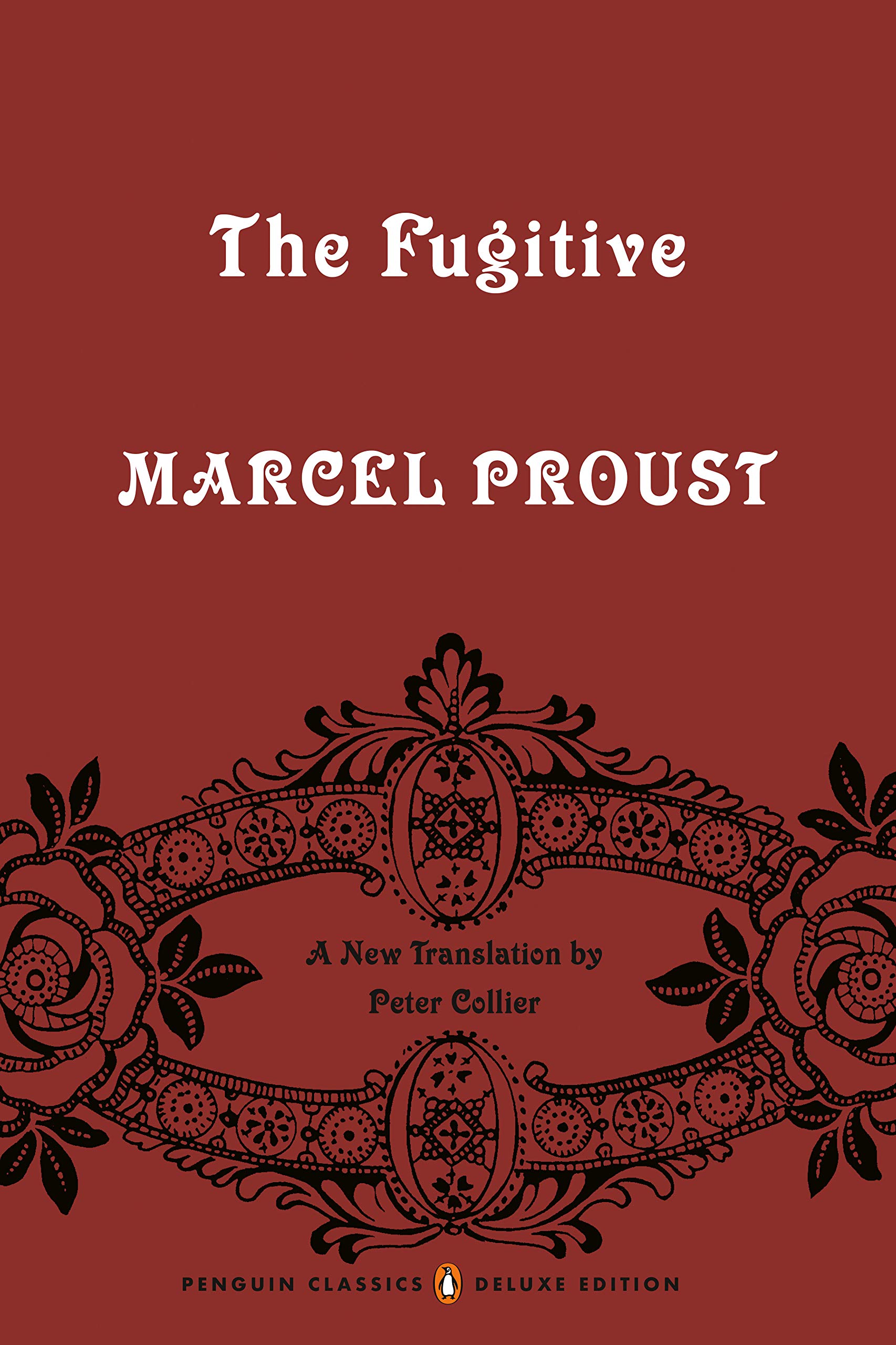
DECEMBER 1: We return to the beginning. We'll read the parts we skipped the week of September 13 and 15.
The narrator mistakes a male brothel for a bar and finds Jupien helping Baron Charlus to be whipped; the narrator discovers his vocation as a writer.
REQUIRED READING:
Finding Time Again / Time Regained, pp. tba
Begin reading at ". . . ." Stop reading at ". . . ."


Email me what you think was the best DQ of the semester by December 5.
Third Paper Due December 9 by 11:59 p.m. Topics to be announced. Email all work for the course to me at
DECEMBER 6
Finding Time Again / Time Regained, pp. tba
Begin reading at ". . . ." Stop reading at ". . . ."


Best DQ of the semester announced.
Nothing Below Is Required for this course. You may stop reading without fear of any consequences whatsoever. The only material you need to read is above the sentence "Nothing Below Is Required for this course." If you have question about what I mean by "Nothing Below Is Required for this course," please contact me in class or email me at [email protected].
While she appeared to have written “Omar killed me,” the sentence contained a glaring mistake — in the original French, “Omar m’a tuer,” instead of “m’a tuée,” using the infinitive rather than a form of past tense.
No New Trial in Murder Mystery That Gripped France, Court Rules
October 14, 2022 NYT
Sherlock Holmes "A study in Pink " season one, episode one. "Rache or Rachel"? German noun meaning revenge or the unfinished name of the victim, "Rachel?" Sound effects off-screen of a fingernail scratching the letters R, e, c, h, and e on the floor.





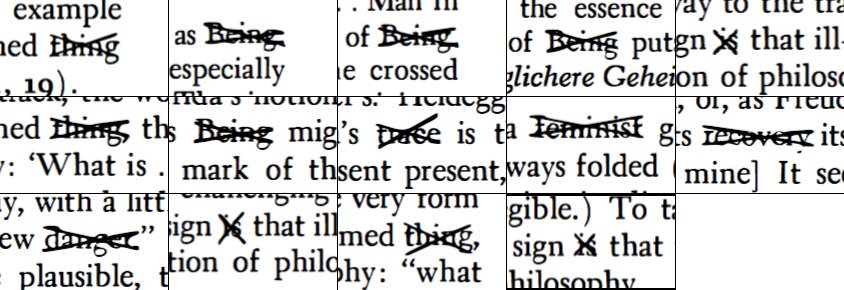
Jacques Derrida "sous rature" in Of Grammatology
Percy Lubbock, The Craft of Fiction

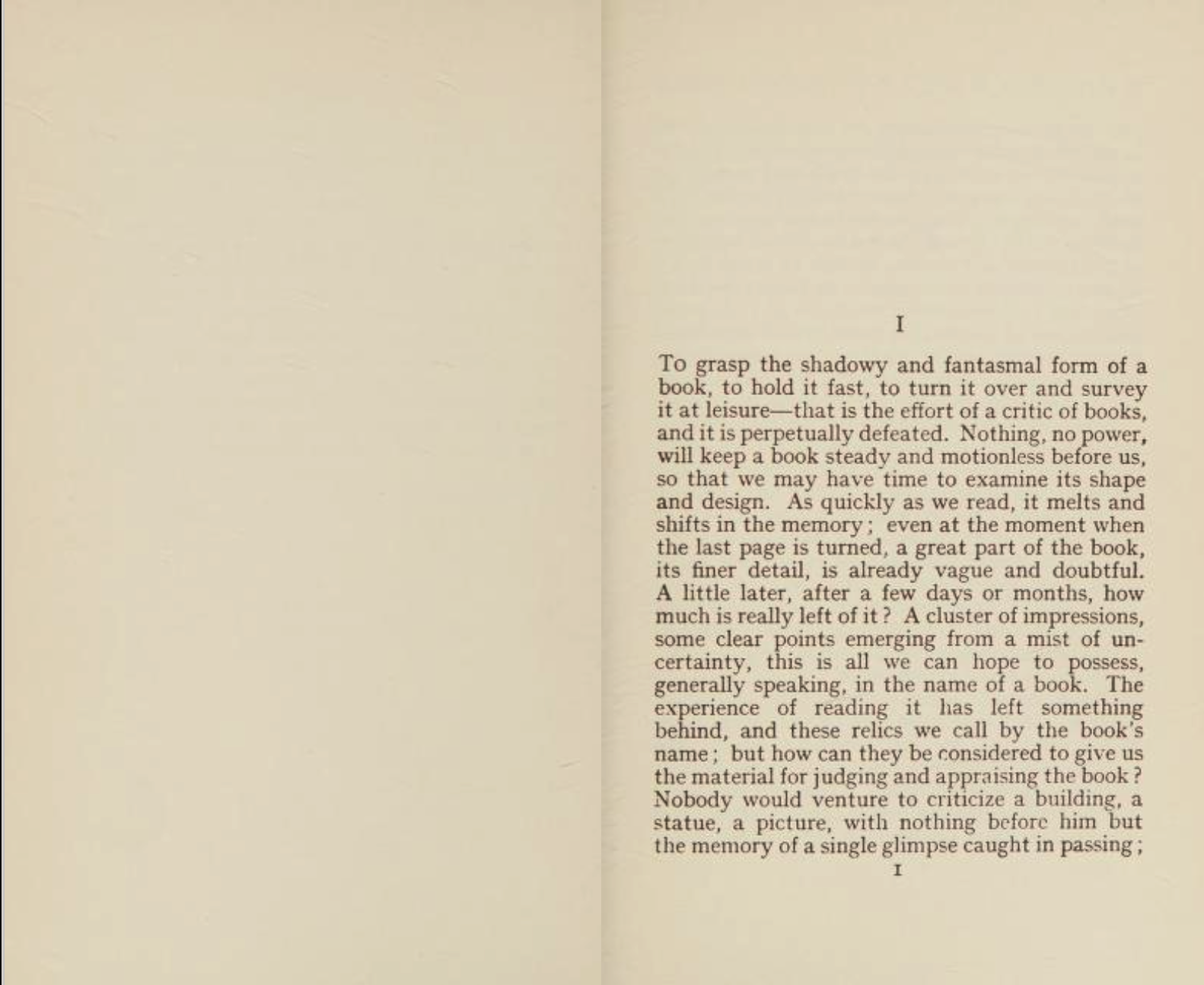
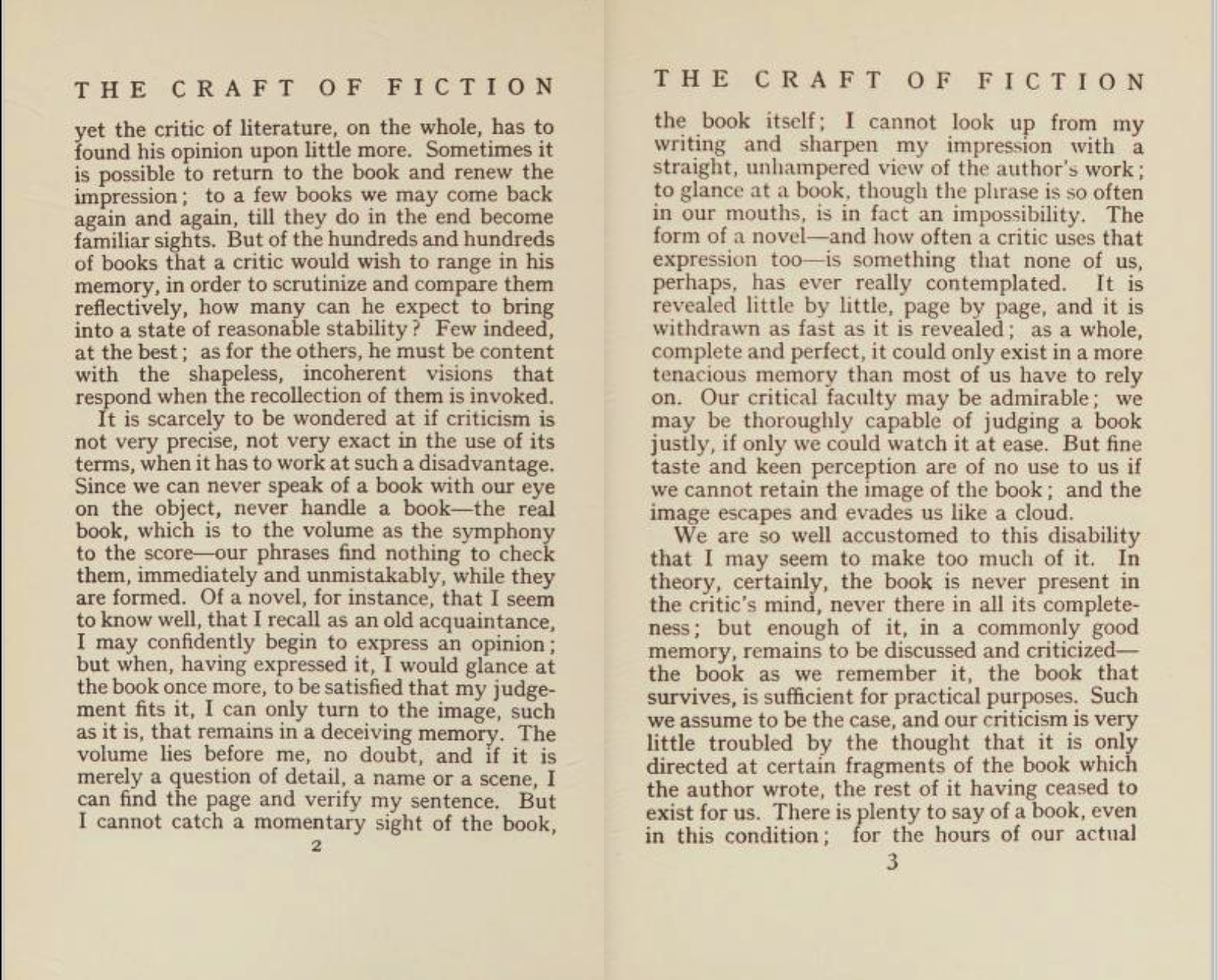
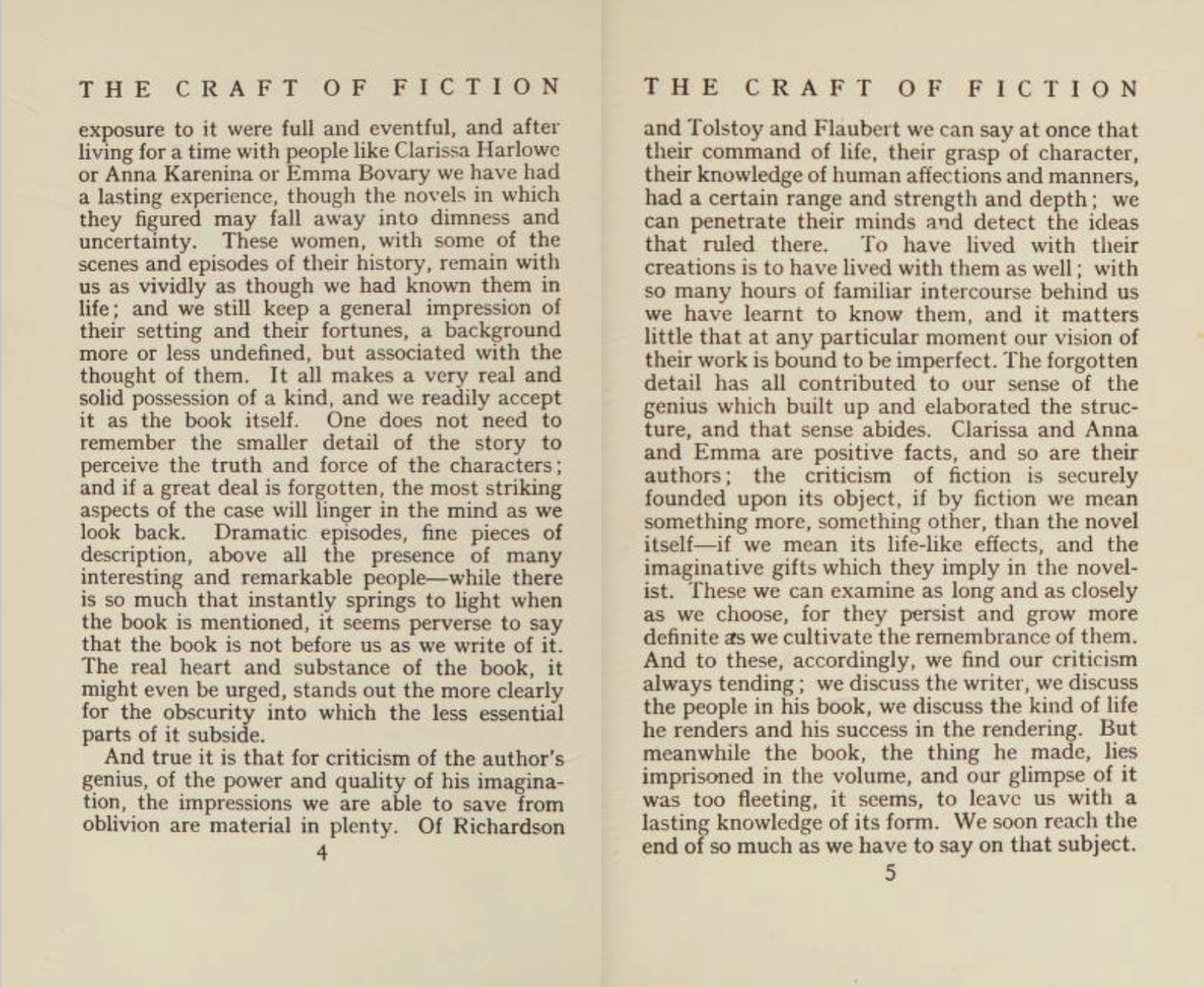
The Reduced Recherche (2021)

À la recherche du temps perdu, de Marcel Proust, (en réduction) et Huvé, Jean-Pascal
La Recherche "en réduction"
Pour tous ceux “ qui ont essayé mais n’ont jamais pu dépasser la première page ” de cette oeuvre monumentale, souvent fastidieuse, voici une version de la Recherche du Temps perdu, élaguée, raccourcie, passant de 3000 à 500 pages, pour le plaisir de découvrir ou de retrouver l’humour, la férocité, la subtilité de l’un des plus grands auteurs du XXe siècle.
Car c’est très long, À la recherche du temps perdu et c’est souvent fastidieux. Les analyses psychologiques - l’amour, la jalousie... - d’une finesse extraordinaire, sont souvent interminables et redondantes; des passages entiers sont singulièrement datés... Et pourtant, quel plaisir de gouter l’humour dévastateur de l’auteur, de rire avec lui en écoutant - car on les entend - les extraordinaires dialogues cruels, spirituels, méchants ou bêtes des Verdurin, Charlus, Guermantes ou Bloch ! De découvrir à travers sa loupe les petitesses des acteurs de cette comédie des apparences ! Quelle jubilation un peu honteuse, aussi, quand nous nous y reconnaissons ! Et, parfois, le coeur se serre devant le chagrin du petit garçon, la gentillesse d’Albertine, les rares moments de bonheur tranquille du jeune narrateur amoureux, la découverte des ravages de la vieillesse... ou tout simplement une belle phrase déchirante.
En voulant faire partager tout cela j’ai procédé un peu comme dans un grand restaurant qui propose un menu degustation où l’on vous donne une petite portion de tout mais où, contrairement à un buffet, on respecte une chronologie digestive qui a un sens. Je n’en suis pas le Chef, mais j’ai composé ce menu en toute subjectivité. Pourtant, presque tout y est. Je n’ai rien changé aux phrases ( j’ai parfois - rarement - exfiltré quelques métaphores compliquées) mais j’ai beaucoup élagué: des pans entiers ont été sacrifiés (la tante Léonie, Françoise, l’affaire Dreyfus...,) beaucoup de moments qui m’ennuient ont été éliminés, et d’autres aussi, que j’aurais tellement aimé garder mais qui seront les délicieuses surprises de ceux qui, après cette Recherche en réduction, voudront remettre le couvert... Je m’étais proposé que cette dégustation tienne en moins de 500 pages. Soit 2500 pages à éliminer. Je n'ai conservé que le plus passionnant, le plus drôle ou le plus émouvant dans les histoires entrecroisées de Charles Swann, le dandy intellectuel, Odette de Crecy, la demi-mondaine, le baron de Charlus, grand seigneur homosexuel, la tyrannique Mme Verdurin, la sublime duchesse de Guermantes, les jeunes filles en fleurs... Voilà mon audace ! Elle me sera pardonnée pour peu qu’elle permette de découvrir l’un des plus grands bonheurs de la lecture ou de s’y replonger.
--Jean-Pascal Huvé
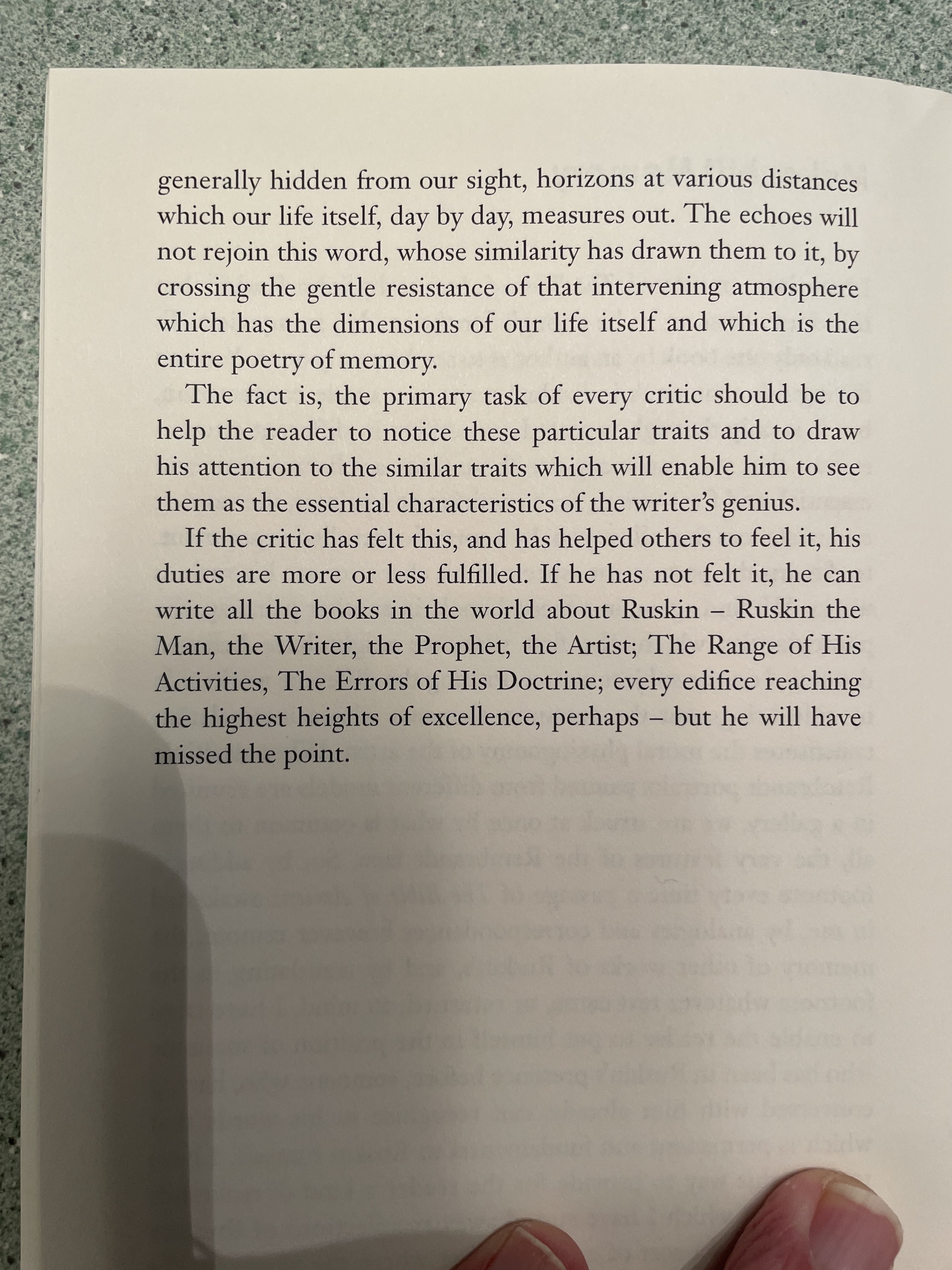
Gérard Genette, "One of my Favorite Authors," Essays in Aesthetics (2005), pp. 191-201

REQUIRED READING:
Gérard Genette, "Figures," in Figures of Literary Discourse, pp. 45-60
Recommended reading:
Gérard Genette, Narrative Discourse An Essay on Method Translated by Jane E. Lewin Foreword by Jonathan Culler (CORNELL UNIVERSITY PRESS) digital facsimile / html
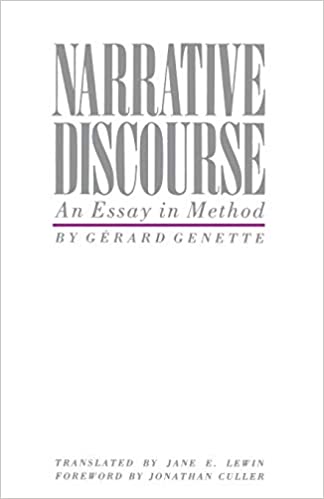

"The Salle Ovale, a reading room in the National Library of France. Its glass roof is nearly 60 feet high." Stephane De Sakutin/Agence France-Presse — Getty Images
REQUIRED READING:
Read all of the last part of Swann's Way, entitled: "Place Names: The Place." (It's on pp. 399-444 in the Davis paperback, but may be easily found in any edition using the title.)
Write two DQs, one on each of the two space breaks near the end of in "Place Names: The Place." These space breaks recall the space break near at the end of "Combray I" ("Overture"). That single break marks a gap in the time of narration, a shift into the petit madeleine episode, and hence serves to mark a kind of conclusion, short of an epilogue, as well. What narrative purpose(s) does each space breaks serve in "Place Names: The Place?" What is the effect of having two rather than one space break? (These are just questions to get you thinking so you can raise your own questions, not questions for you to answer.)
Space Break 1 (Norton edition, p. 387) begins: "I always had within reach of my hand a map of Paris which, because one . . ."(p. 429, print, Davis)

Space Break 2 (Norton edition, p. 378) begins "The sense of the complexity of the Bois de Boulogne makes it an artificial place, and in the zoological or . . . " (p. 438, print Davis)

FYI: Just more space breaks to compare, if you wish.
Space break at the end of "Combray I" ("Overture")

Space break 1 in "Combray II" (p. 153, Norton)
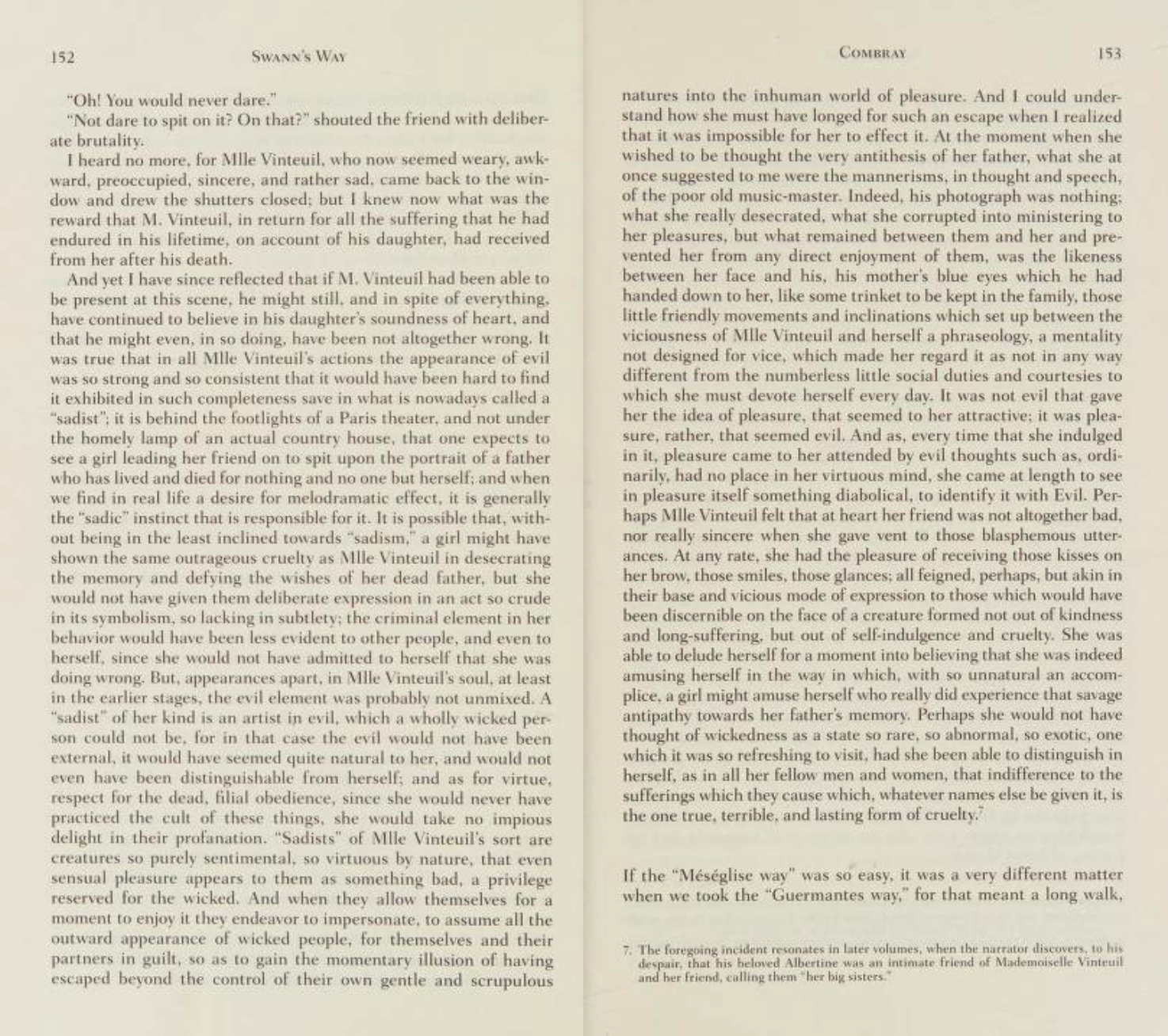
Space break 2 in "Combray II," p. 172 (Norton)
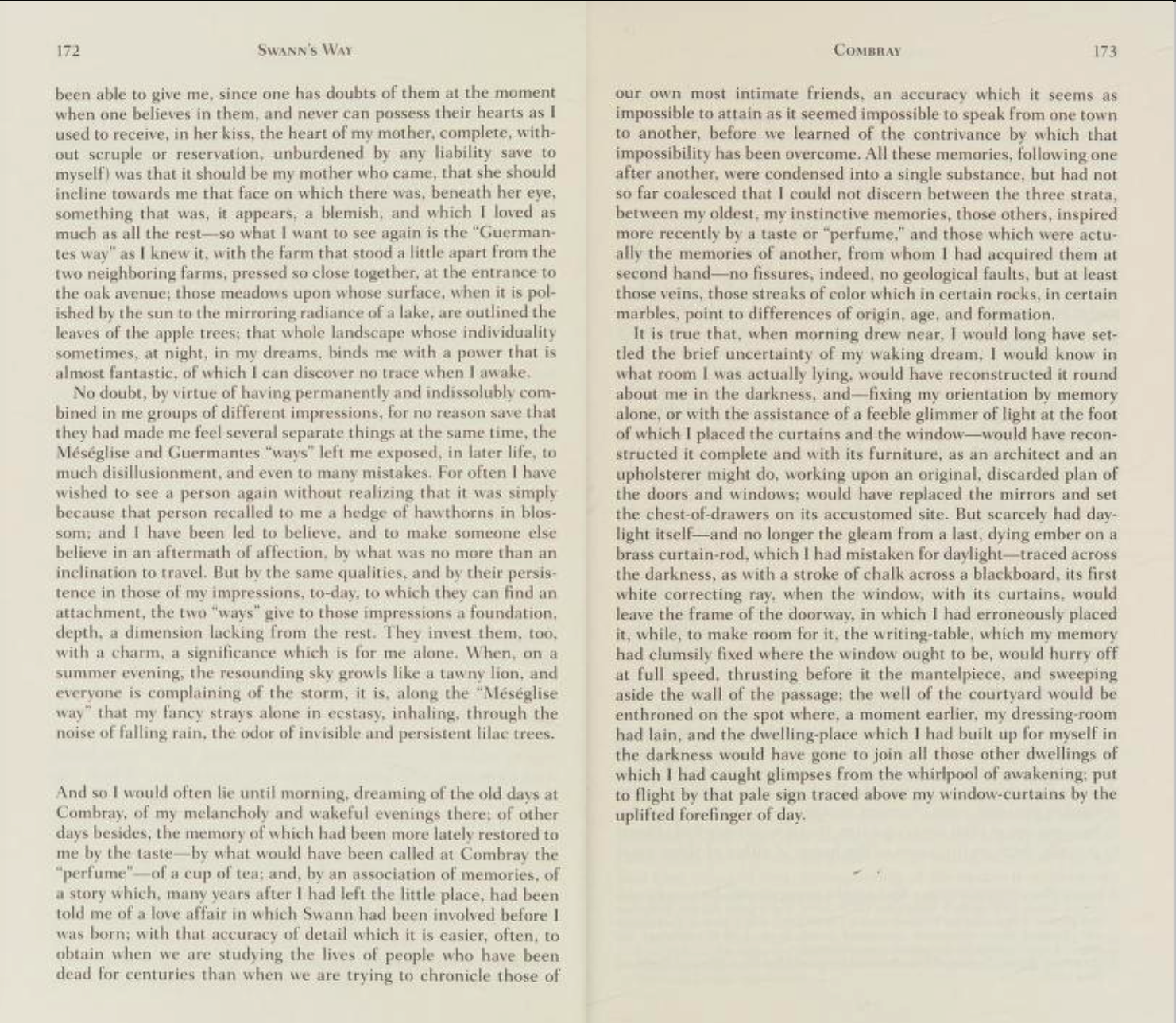
Space break in Swann in Love, p. 231 (Norton) There is no space break near the end of this part of Swann's Way
Marcel Proust (1871–1922) wrote a long book that even the most casual reader usually makes longer by adding notes on the endpapers. À la recherche du temps perdu exists to be annotated. A commonplace book in the classic sense, it is, itself, a set of annotations to all the works of art that Proust has read, looked at, listened to or otherwise enjoyed—and to everything he knows about nature, natural science, love, sex and the workings of the mind. This book you are reading now could easily have been ten times as long if it had contained nothing else but expansions on the notes I have made from reading Proust in several editions over the course of forty years. (In view of that threat, I have confined myself to a single short essay at this point, but you will have noticed, elsewhere in the book, that reflections on Proust tend to creep in when other writers are under consideration: a ubiquity of relevance by which, when it is acknowledged, one of his admirers will often spot another, whereupon they will start discussing Proust in lieu of the previous topic.) Forty years and no end in sight. War and Peace is big book too, but you are through it comfortably in a week, and all set to start again one day. À la recherche du temps perdu is never done with, because it keeps growing while you are reading it. Like no other book in the world, Proust’s book leads everywhere: a building made of corridors, and the walls of the corridors are made of doors. The student can happily find an entrance through the Modern Library’s six-volume In Search of Lost Time. This covetably handsome set, bravely decorated with photographs of the author, is basically the 1920 Scott Moncrieff translation (published serially throughout the 1920s under the title of Remembrance of Things Past) which was revised in the 1980s and 1990s by Terence Kilmartin and D. J. Enright. The whole enterprise took three-quarters of a century fully to materialize in English, and no student’s bookshelf should be without it. But it might not be long before the urge arises to read the text in the original.
This urge should not be resisted. Pedants and snobs are fond of declaring that only accomplished French speakers can catch Proust’s tone. That might be so, but the tone is only one of the things to be caught. There are whole levels of complexity that can be opened up by an elementary knowledge of written French, and the elementary knowledge is likely to expand usefully as the recherche goes on. I myself learned what French I have from reading Proust. It took me fifteen years before I could read confidently during the day without a dictionary, and even then I took home a list of words to be looked up in the evening. (A Larousse is essential to back up an ordinary dictionary: as Pasternak said of Pushkin, Proust is full of things.) But the mental improvement was well worth any feelings of inadequacy. The idea that your French needs to be perfect in the first place if you are to appreciate France’s greatest writer is as absurd as the idea that you need to be able to read music in order to appreciate Beethoven’s late quartets. If Beethoven had thought that, he would never have written them. Similarly, with Proust, a book entirely dependent on its language would not have interested him. When he was younger he was preoccupied with style, but always as a measure of compression and intensity; and he put the preoccupation behind him when he matured into a freedom that was all discipline, and a discipline that was all freedom.
Even his social climbing was dedicated to his art. There can be no doubt that he found the high life fascinating, but nothing is too mundane to get into the book, and its true aristocrats are artists. In Britain up to the present day, even in the work of such a clever critic as John Carey, it is often assumed that the concept of high art, because it was once the property of the landed gentry, is part of a traditional mechanism to repress the common people, and should therefore be denied its prestige. The Americans suffer less from that idea, but if it ever needed countering, the mere existence of Proust would be enough to do it. He places art firmly in the possession of those who love it, whatever their origins might be. His gentry, in fact, are those most likely to succumb to the epidemic Philistinism of the prejudice against Dreyfus. Zola was the most famous liberal commentator on the Dreyfus case but it was Proust who saw the matter through. In foreseeing the corrosive effects of licensed anti-Semitism on the civil order, Proust opened yet another door, the one leading into the accumulating political disaster of France between the wars. How so frail and troubled a man could have had all this strength and wisdom in him is a mystery. The mystery has been often explored, but George D. Painter’s two-volume biography Marcel Proust is still the book to read about his life. (William C. Carter’s single hefty volume is a valuable corrective but not a replacement.) The best single critical book is Jean-François Revel’s Sur Proust, if only because Revel firmly warns us off the standard wild goose chase of looking for the novel’s structure. It might have one, but only in the sense that we think we have learned something about the structure of the universe when we are told that space is curved.
clivejames.com"Even more their [the students'] introduction to a way of participating in reality, Proust redefines reality. And for this I regard him as one of our greatest thinkers. He’s no “aesthete” as superficial readers say of him, but rather a writer for whom the aesthetic consciousness leads us into reality itself. (That’s a claim which Proust in the early volumes is testing and that he redeems, I think, in the end.) "
--Charlie Stephen
"The Recherche, more than all other works, must not be considered closed. . . .
If the Recherche was complete once, it is not so anymore, and the way in which it
admitted the extraordinary later expansion perhaps proves that
that temporary completion was, like all completion, only a retro-
spective illusion. [Proust writes about retrospective illusions.] We must restore this work to its sense of unfulfillment, to the shiver of the indefinite, to the breath of the
imperfect. The Recherche is not a closed object: it is not an object.
Here again, no doubt Proust's (involuntary) practice goes be-
yond his theory and his plan — let us say at least that it corre-
sponds better to our desire."
-Gérard Genette, Narrative Discourse An Essay on Method Translated by Jane E. Lewin Foreword by Jonathan Culler (Cornell University Press), 21; 268. facsimile / html
Because the different chance events which bring us into contact with certain people do not coincide with the time during which we are in love with them, but, extending beyond it, may occur before it begins and repeat themselves are it has ended, the earliest appearances in our our lives of a person destined later to captivate us assume retrospectively in our eyes the significance of a warning a presage.
--Finding Time Again
"What were perhaps more unsettling were the cases in between . . . "; Finding Time Again, 27
J_Hillis_Miller, "Middles," in Reading_Narrative, pp. 61-77
Mathilde Brézet, Le grand monde de Proust: Dictionnaire des personnages de la Recherche du temps perdu (2022)
What are aesthetic values? (a question posed by Genette)
Marcel Proust, On Reading
Paintings in Proust (Vol. 1, Swann’s Way)
"The Trials of Moses" / Fresco
"Rereading Proust in 2022" Antoine Compagnon
Isabelle Serça, Proust et le temps: Un dictionnaire (2022)
Isabelle Serça, Les coutures apparentes de "La recherche" - Proust et la ponctuation (2010)
Recommended Readings:
"I shall work on a book on the Arabian Nights and the Memoirs of Saint-Simon."
--Time Regained, 353 (The narrator's mother gives the narrator two translations of the Arabian Nights for his birthday, one by Antoine Galland, the other by Joseph-Charles Mardrus.)
Selections from an English translation of Galland's edition, Arabian Nights' Entertainment, ed, Robert L. Mack, pp. 1-11; 66-80; 764-86; 605-50; 140-78.
Introductory Tale; The Story of the Three Calenders, the Sons of Kings, and of the Five Ladies of Baghdad; The Story of Sinbad the Sailor; The Story of the Sleeper Awakened; The Story of Ali Baba and the Forty Thieves Destroyed by a Slave
More Recommended Reading and Listening:
Rimsky-Korsakov: Scheherazade
The One Hundred and Twenty-First Night through the One Hundred and Sixty-Eighth Tales: Scheherazade tells a story about Jafer telling a story that the tailor tells. "The Tailor's Story" tells the Barber's Story, who tells the story of the Barber's brother (Norton 2010, Ed. Daniel Heller-Roazen) pp. 224-58
Tzvetan Todorov, "Male Narratives: The 1,001 Nights," in The Poetics of Prose
Saul Friendlander, "Arabian Nights," in Proustian Uncertainties: On Reading and Reading in Serch of Lost Time (2020), pp. 89-96.
Arabian Nights Tales of 1,001 Nights Volume 1
In my case it was not the farewell of a dying man to his wife that I had to write, it was something longer and addressed to more than one person. Long to write! At best I might attempt to sleep during the day-time. If I worked it would only be at night but it would need many nights perhaps a hundred, perhaps a thousand. And I should be harassed by the anxiety of not knowing whether the Master of my destiny, less indulgent than the Sultan Sheriar, would, some morning when I stopped work, grant a reprieve until the next evening. Not that I had the ambition to reproduce in any fashion the Thousand and One Nights, anymore than the Mémoires of Saint-Simon, they too written by night, nor any of the books I had so much loved and which superstitiously attached to them in my childish simplicity as I was to my later loves, I could not, without horror, imagine different from what they were. As Elstir said of Chardin, one can only recreate what one loves by repudiating it. Doubtless my books, like my fleshly being, would, some day, die. But one must resign oneself to death. One accepts the thought that one will die in ten years and one's books . . .
It might perhaps be a book as long as the Thousand and One Nights but very different. It is true that when one loves a work one would like to do something like it but one must sacrifice one's temporal love and not think of one's taste but of a truth which does not ask what our preferences are and forbids us to think of them. And it is only by obeying truth that one may some day encounter what one has abandoned and having forgotten the Arabian Nights or the Mémoires of Saint-Simon have written their counterpart.
--Proust, Finding Time Again
Memoirs of Louis XIV and the regency by the Duke of Saint-Simon; tr. by Bayle St. John
Julia Kristeva, Time and Sense: The Proustian Experience
Richard Macksey, "Conclusions" et "Incitations": Proust à la recherche de Ruskin
MLN, Vol. 96, No. 5, Comparative Literature (Dec., 1981), pp. 1113-1119
https://www.jstor.org/stable/2906239
Macksey, Richard A., 'Proust on the Margins of Ruskin' in The John Ruskin Polygon: Essays on the Imagination of John Ruskin. Ed. J. D. Hunt and F. M. Holland, Manchester University Press,
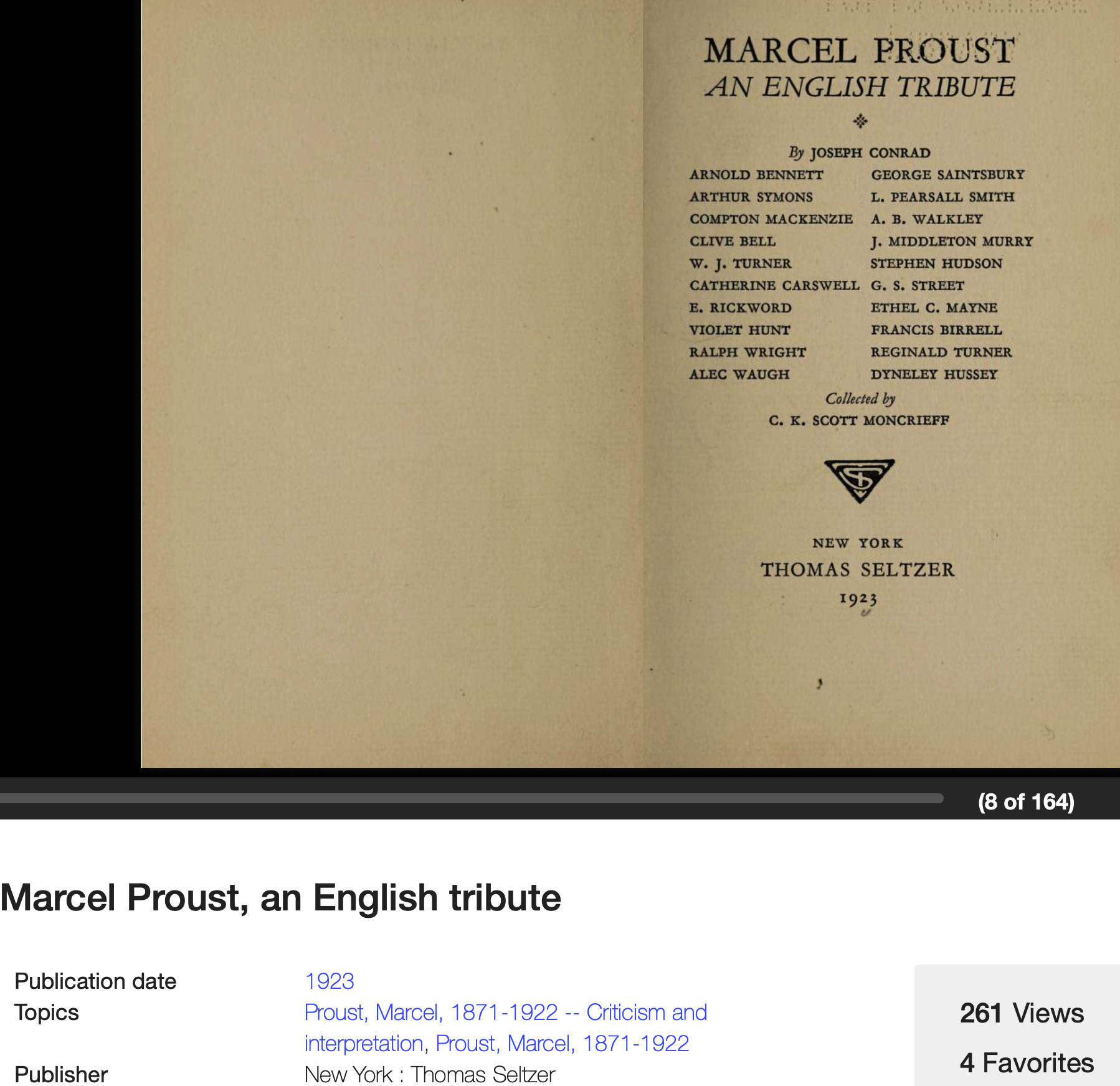

See the résumés (in French) of all seven volumes online at marcel-proust.com or at
Résumé d'A la recherche du temps perdu, de Marcel Proust
Marcel Proust, Du côté de chez Swann: résumé
resume-proust-cote-de-chez-swann.php (with table of contents)
du-cote-de-chez-swann-swanns-way-premiere-partie-combray/
Resumés: Proust's editors and translators put summaries at the end of each volume. Why? Do they work? Why did they become progressively longer until the last volume? How do they differ from Proust's tables of contents? How are different they from guide books? See Terence Kilmartin's In Search of Lost Time, Volume VI: Time Regained Reader’s Guide
See also:
Or see Carol Cook's translation of The Prisoner for this plot summary.
Consider the way Proust breaks up a continuous narrative of all seven volumes with chapters with titles and subtitles in each volume in resume by adding more subtitles with items that are apparently equivalent (given they have the same font and font size). What kind of discontinuous reading or rereading is Proust encouraging? Gerard Brun, the editor of a French edition (1986) of Time Found Again says that the novel is discontinuous because imcomplete and that it was not divided into sections by Proust. Nevertheless, Brun breaks the novel up into the same sections both in the introduction and in the resume, or synopses.
http://users.clas.ufl.edu/burt/formsofnarrative2022/proust-and-the-arts
Here are pdfs of all seven of Proust's synopses taken from the Viking / Penguin edition, Christopher Pendergast general editor.
Marcel Proust | A la recherche du temps perdu | Texte intégral
Pour des recherches sur le seul texte d'A la recherche du temps perdu,
sans l'anthologie, les études, ni les autres textes du site Marcel-Proust.com,
utiliser notre autre site : Alarecherchedutempsperdu.com
First page of "All day long, in that slightly to bucolic resisdence . . . up to "
But we must go back to where we were" pp. 3-114 (Patterson);
114-176 (Patterson) up to "Still wondering what the answer was, and determined to
176-279 "more than one of the individuals assembled at this party"
279-358 (the rest of the novel)" . . . et monotone pientinement rustique dans l'ombre."
Fin du sejour a Tonsonville / At Tonsonville (Penguin);
Overture (French 1986) (left out in the Penguin translation); l'homosexualite (French 1986); (left out in the Penguin translation),
Le pastiche de Goncourt (French 1986) The Goncourt "Journal" (Penguin)
La Guerre (French 1986) (M. de Charlus during the war: his opinions and his pleasures," Penguin)
Second retour a Paris, Premier retour a Prais, Second retour a Paris, Rencontre avec Charlus (French 1986) (all left out in the Penguin translation)
L'hotel de Jupien (French 1986) (Jupien's hotel)
La mort de Saint-Loup (French 1986) (left out in the Penguin translation)
"Je songeais que je n'avais revu depuis rien . . . ."
L'Adoration Perpetuelle (French 1986) (The Princess de Guermantes' afternoon party. Perpetual Adoration, Penguin)
Troisieme retour a Paris; rencontre avec Charlus (left out in the Penguin translation)
Le Ball de Tetes (The "Ball de Tetes" ['Masked Ball'], Penguin)
Le gouter de la Berma (French 1986) (left out in the Penguin translation)
"Ainsi a tous les moments de sa duree, le nom de Guermantes"
"De concerts en concerts passe sa vie ce sterile amateur"
Preliminary attractions:
Marcel Proust was gay, Jewish, and kinky. And he was French.
I don't do trigger warnings. I considered myself an adult when I went to college at age 18. Professors and graduate student T.A.s felt the same way about their students. I would have been insulted if any professor or T.A. told me I might feel a certain way about a film or a book before I'd had a chance to see it or read it myself. I was sometimes upset by a film I saw or a book I read. I still am. I felt and still feel that being disturbed by literature or film was part of learning and learning how to live. And I didn't think--and still don't--that talking about it necessarily makes it any less emotionally disturbing. If you tend to be "triggered," or if you object to nudity or controversial subjects, I advise you against taking this class or any course on literature or film. imo. No judgment. This course is an elective. You are not required to take it. It is your responsibility to look through the schedule to determine if there are any materials you may find objectionable. If you do, just drop the class now. Thank you.

What are trigger warnings even for?
Literature may be bad for your health. Just look at Cervantes' Don Quixote and Flaubert's Madame Bovary. In Stendhal's The Red and the Black, the heroine's mother does not allow her daughter to read the novels of Sir Walter Scott. And the German philosopher Immanuel Kant warned against "reading addiction." The ancient Greek philosopher Plato banned literature and the arts from his imaginary republic.
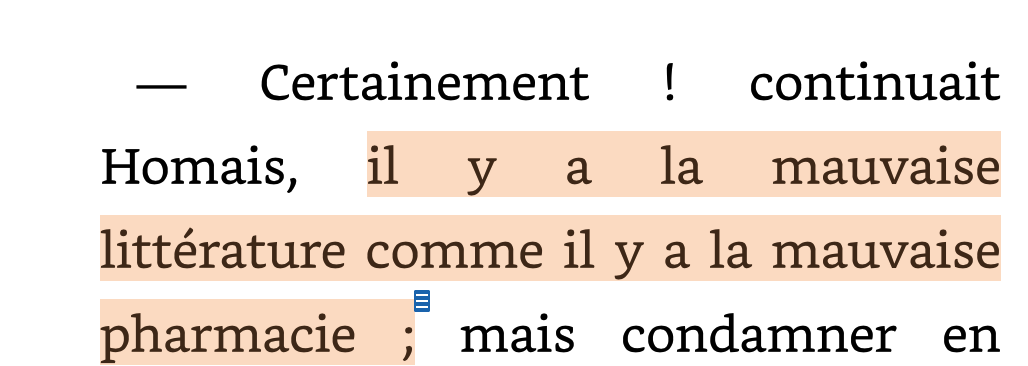
"Certainly! . . . There is bad literature just as there are bad drugs." (My translation)
--Gustav Flaubert, Madame Bovary
In the Recherche, the narrator's grandmother also regulates what the narrator can and cannot read when a child and adolescent.
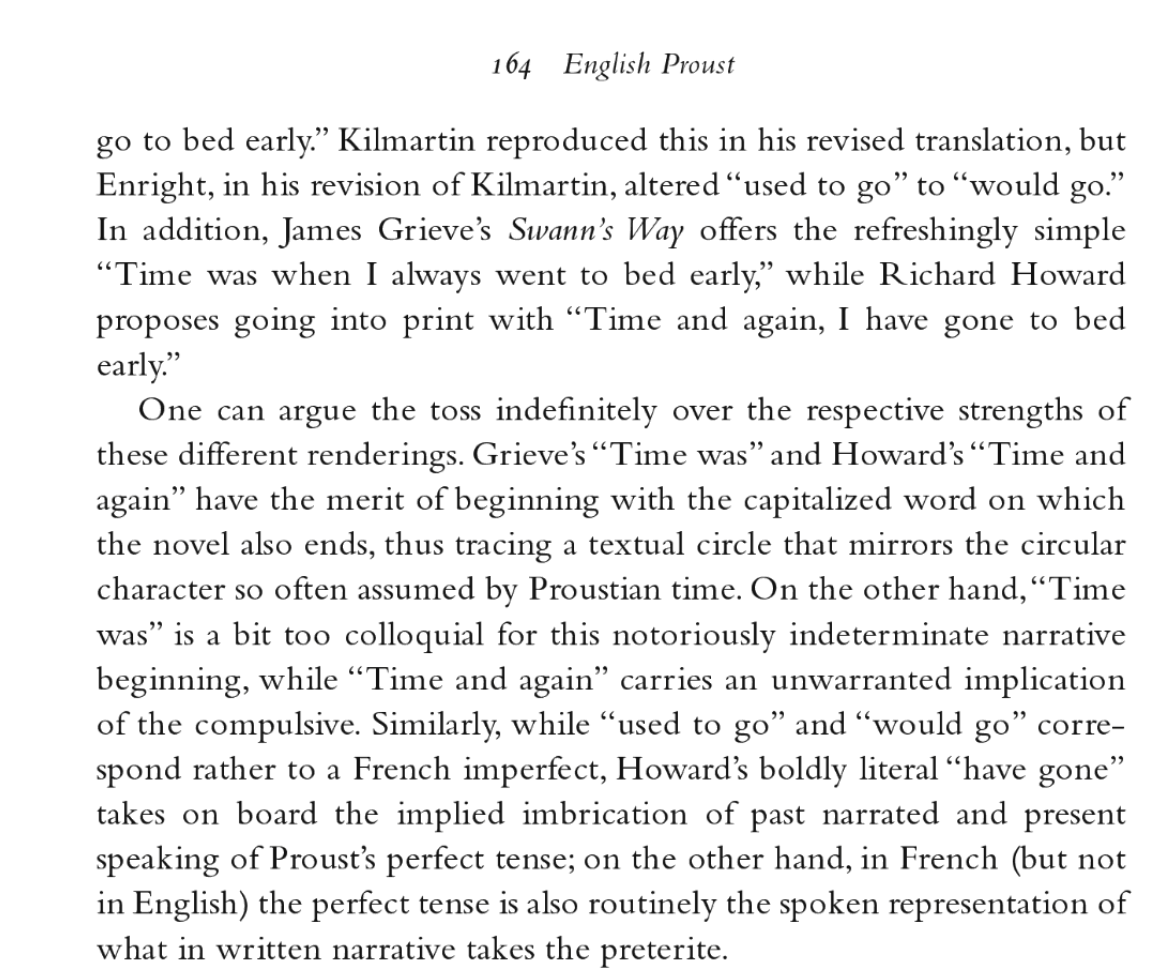
OK. Let us begin discussing
Marcel Proust, À la recherche du temps perdu Remembrance of Things Past / In Search of Lost Time:
SCOTT, C.K. TR., SWANN’S WAY Vol 1
Marcel Proust, Swann's Way, C.K. Montcrieff et al, Modern Library 1992
Translations of the first sentence of Du côté de chez Swann (1913) / Swann's Way / The Way by Swann, the first of seven volume's of À la Recherche du Temps Perdu / Remembrance of Things Past /In Search of Lost Time:
"'Longtemps, je me suis couché de bonne heure.'
Moncrieff and Kilmartin translated that very simply and directly: ''For a long time I used to go to bed early.''
An Australian translator of ''Swann's Way,'' James Greive, in an effort to achieve this, translated the first sentence thus: ''Time was when I always went to bed early.'' Howard believes that the phrase ''time was'' is a brilliant stroke. But he criticizes the Grieve translation for adding a word - ''always'' - that is not in the original. Howard's translation of the first sentence is: ''Time and again, I have gone to bed early.''
Roger Shattuck and Douglas Alden, writing recently in the Times Literary Supplement, explain that Proust died before the work was complete and thus never approved a final version."
--Richard Bernstein, "HOWARD'S WAY" (An interview with celebrated translator Richard Howard about a translation of the Recherche he was undertaking at the time but never finished and never published any part of it.)
James Greive's Swann's Way (Australian), the first few pages
NO KNOWLEDGE OF FRENCH IS REQUIRED FOR THIS COURSE. A desire to learn is required. I'm linking these interviews in French below only so I can find them. You are not required to listen to them, of course
What is a work of art? / Art in the Age of 2nd-Order Observation ft. Walter Benjamin
Discussion questions are due every Monday and every Wednesday by 5:00 p.m.
Ebooks for the Modern Library and Viking / Penguin editions of Proust's novels may be found here. They may be available for less at other online vendors. They should also be available in paper at the UF bookstore. You don't have to buy anything right now. The first readings are free.
https://www.getabstract.com/en/summary/in-search-of-lost-time/31472
REQUIRED READINGS: (Write on question for each reading)
Proust as a Novelist (pp. 15-40)
Roland Barthes's Narratology (pp. 41-64)
Paintings in Proust (Vol. 1, Swann’s Way)
Morrissey reads Proust : Luxuria
Ratatouille (2007) - Anton Ego Tastes Ratatouille - Flashback Scene that calls up the petites madeleines episode in Swann's Way
La leçon de Marcel Proust selon Gérard Genette
La leçon de Marcel Proust selon Roland Barthes
Observation: Marcel as observant person, a kind of model reader, a way of life
What makes a good book good? Or a bad book bad? (A bad book can still be worth reading.) Just because a book is good does not mean you have to like it. You just have to have reasons. Conversely, just because a book is bad does not mean you have to dislike it. You just have to have your reasons.
Aesthetic Judgment:
"Insofar as the technique and the product lead us to dismiss the losers in the rankings, we are obviously using them to blind ourselves to the future possibilities of those losers and to the fact that hierarchies seldom remain un changed. In the other direction, however, I find it hard to imagine that many of the things that we care about-loving someone as opposed to some other one, preferring this critic to that, even choosing to read this book rather than that-would be possible without comparison. For it is hard to imagine judgments without comparison, as John Barrell suggested when he maintained that Western society since the eighteenth century had made evaluation-the perception of the value of this as opposed to that-the most common of common activities."
--Frances Ferguson
What is critical thinking? What is a good question to ask about a book?
Meaning is about intention, not impact. No word means the same thing every time it is used for eternity. No word comes with one meaning attached and always means the same thing. Words may have many meanings, and meaning is always determined by syntax (word order).
Consider "strong" as an example. Maybe not.
1. Gérard Genette, "One of my Favorite Authors," Essays in Aesthetics (2005), pp. 191-201
2. Gérard Genette, "The Frontiers of Narrative," in Figures of Literary Discourse (narration and description; narrative and discourse), pp. 127-44

snob / snobbery
On the Anxiety and Vanity of Marcel Proust, Debut Novelist
Tentative Plan for the end of the semester: I’ll have each of you trace a character through all of the novel including the parts we skipped and give a synopsis in class. They’ll also have to provide a table of contents to their synopsis like the Proust does at the end of each volume. And I’ll assign different plot summaries for each volume. Take maybe the last four reports. And in the two hour block I would present previously unread passages we can read aloud and then close read.
"We readers of Madame Bovary in English know that we’ll never hear in our own ears the niceties of pitch, tone, inflection, and nuance in Flaubert’s infinitely supple narrative voice as we can hear them in, say, Jane Austen’s. We also know that no novelist has placed so much stress on these qualities as Flaubert, whose painstakingly constructed sentences are as much the “subject” of the novel as Emma herself. In addition, we’re aware that Flaubert works like a collagist, building an utterly original and perfectly proportioned composition out of worn scraps of language—a language we cannot properly read."
--Jonathan Raban, "Flaubert, Imperfect" NYRB October 14, 2010
James Joyce's A Shorter Finnegans Wake Ed. Anthony Burgess (Viking: 1939), Foreword, pp. vii-xxviii.

Reading Won't Make You a Better Person
Repetition, AND the LIMITS of RESEMBLANCE: Looking looking head on or obliquely as different ways of understanding.
Oblique Perspective in Hans Holbein's The Ambassadors (anamorphosis); Jacques Derrida on oblique reading in Passion: An Oblique Offering.
La leçon de Marcel Proust selon Roland Barthes
Retrouvez bien d'autres archives sur Marcel Proust ici : http://bit.ly/2EeojUr
La Pléiade : du courant littéraire à la prestigieuse bibliothèque
Leo Spitzer, "Intuition and " Philology

PK Feyerabend, Against Method: Outline of an Anarchistic Theory of Knowledge(1975)
Hans-Jörg Rheinberger, "Scrips and Scribbles," MLN, Vol. 118, No. 3, German Issue (Apr., 2003), pp. 622-636.
Russell L. Ackoff, The Art and Science of Mess Management "Interfaces, Vol. 11, No. 1 (Feb., 1981), pp. 20-26
"The Sceptics, the only honourable type of respect among the ever-so multiply ambiguous tribe of the philosophers!"
--Nietzsche, Ecce Homo: How One Becomes What One Is
The one thing which we seek with insatiable desire is to forget ourselves, to be surprised out of our propriety, to lose our sempiternal memory and to do something without knowing how or why; in short to draw a new circle. Nothing great was ever achieved without enthusiasm. The way of life is wonderful; it is by abandonment. The great moments of history are the facilities of performance through the strength of ideas, as the works of genius and religion. "A man," said Oliver Cromwell, "never rises so high as when he knows not whither he is going." Dreams and drunkenness, the use of opium and alcohol are the semblance and counterfeit of this oracular genius, and hence their dangerous attraction for men. For the like reason they ask the aid of wild passions, as in gaming and war, to ape in some manner these flames and generosities of the heart.
--Ralph Waldo Emerson, Essays, First Series
Btw, don't even think of going to graduate school to get a Ph.D in English--or any other kind of--literature.
Stephen Marche, a survivor of academia, returns to a troubled field"
TLS, June 2019
Embedded Narratives (II) The Saragossa Manuscript (dir. Wojciech Has,1965) Part One

Recommended Reading:
Roger Callois, "Introduction" to The Saragossa Manuscript (1960)
Richard van Leeuwen, Potócki, Proust and the "Thousand and one Nights": the Mystery of the Night," Marcel Proust Aujourd'hui Vol. 3 (2005), pp. 143-160
The Saragossa Manuscript (dir. Wojciech Has,1965) Part Two

RECOMMENDED READING:
Anne Carson's dramatic reading of her "essay" 'The Albertine Workout' (Aug 2, 2014 in the LRB; published by 2014 by New Directions)
The Albertine Workout Pamphlet (2014) includes numerous appendices placed after the poem, appendices that Carson does not include in her reading and that is is not included nor mentioned in the LRB publication of 2014.
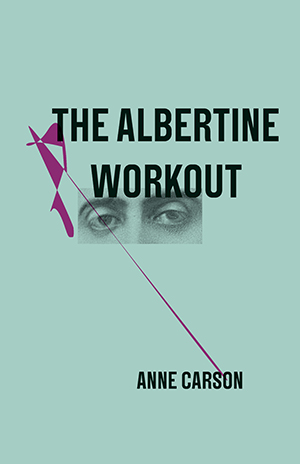
The "Transposition Theory" (and Its Rebuttal):
Justin O'Brien, "Albertine the Ambiguous: Notes on Proust's Transposition of Sexes." PMLA , Vol. 64, No. 5 (Dec., 1949), pp. 933-952
Harry Levin and Justin O'Brien, "Proust, Gide, and the Sexes." PMLA Vol. 65, No. 4 (June, 1950), pp. 648-653
Recommended Viewing:
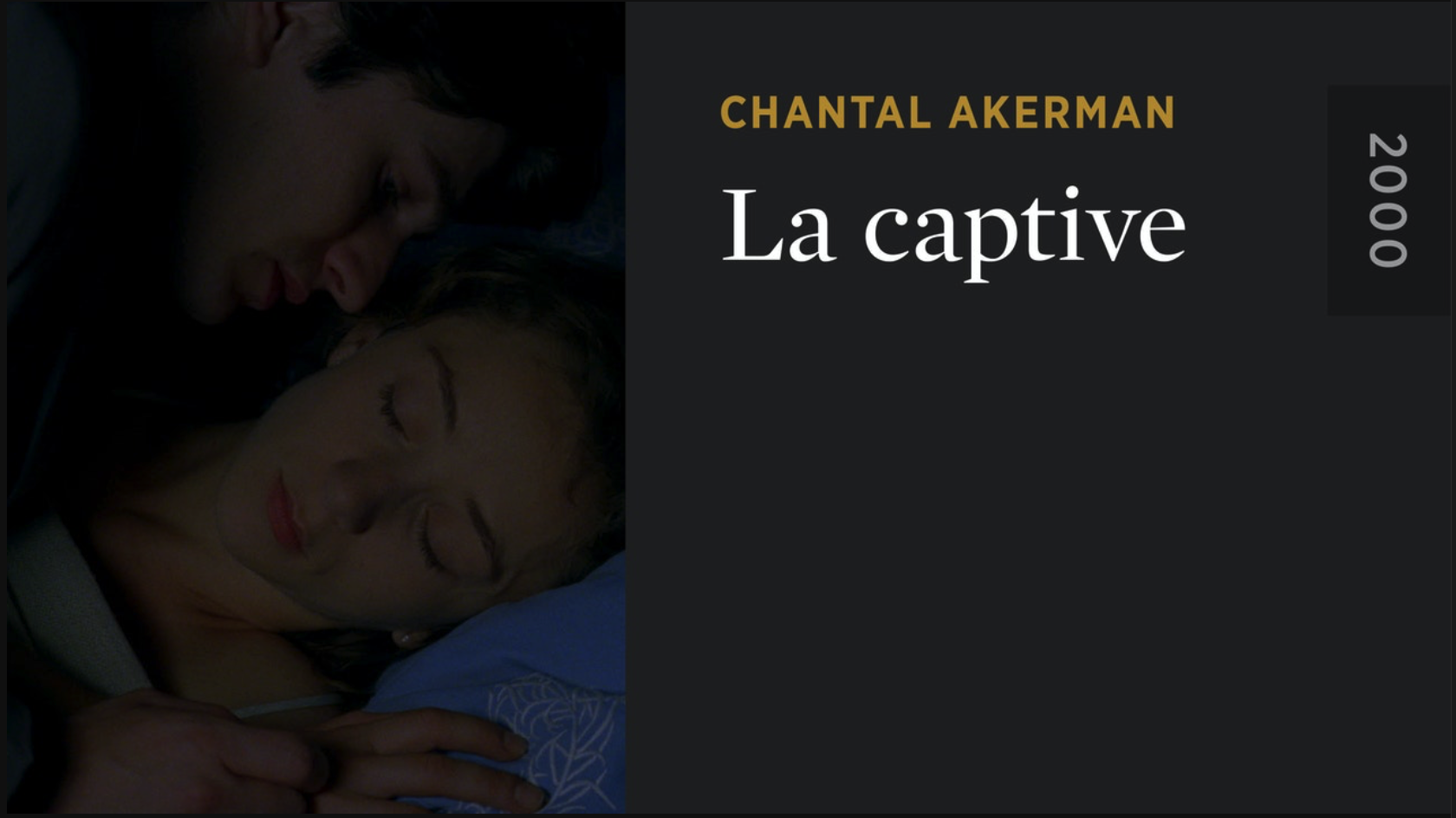
"Directed by Chantal Akerman • 2000 • Belgium, France
Starring Sylvie Testud, Stanislas Merhar, Olivia Bonamy
Adapting the fifth volume of Marcel Proust’s “In Search of Lost Time,” Chantal Akerman transforms the material into a mesmerizing study of voyeurism, control, and sexual obsession centered on the relationship between a possessive young man (Stanislas Merhar) and his passive lover (Sylvie Testud), whom he is convinced is carrying on a lesbian affair. As he relentlessly stalks her every move, the two find themselves imprisoned in a cycle of jealousy, erotic longing, and self-destruction."
Chantal Akerman, La Captive (2000)
Time Regained (dir. Raul Ruiz, 1999)
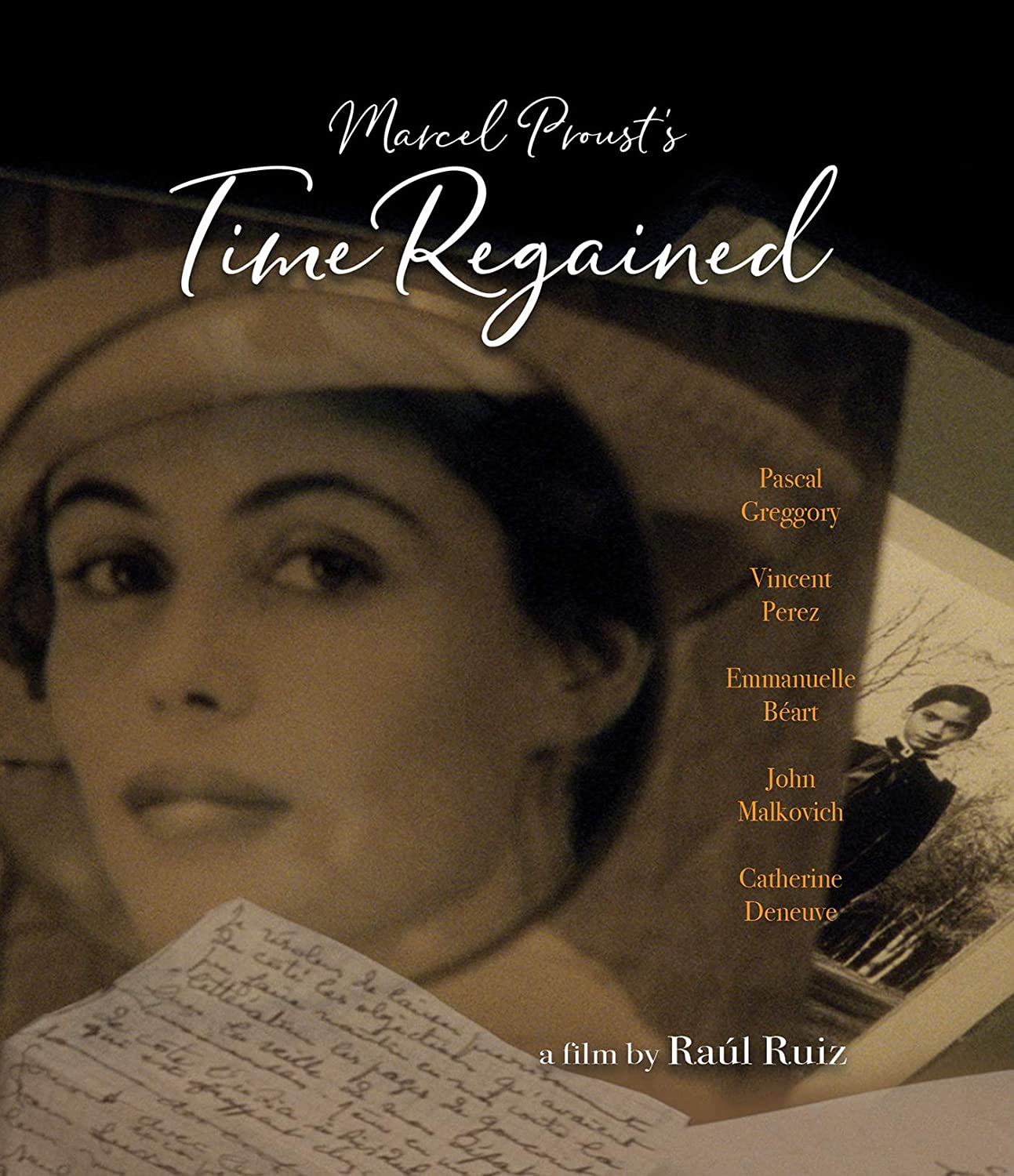
Swann in Love
Directed by Volker Schlöndorff • 1984 • France
Starring Jeremy Irons, Ornella Muti, Alain Delon
Volker Schlöndorff’s sumptuous adaptation of the first volume of Marcel Proust’s “In Search of Lost Time” stars Jeremy Irons as the appropriately named Charles Swann, a beautiful bachelor, majestic in manner, but prone to foul displays of emotion. He swims in the best circles of 1890s Paris, until a destructive love for a seductive courtesan named Odette (Ornella Muti) leads him astray.
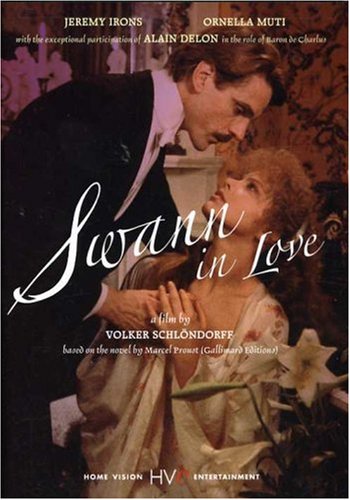
Céleste (dir. Percy Adlon, 1980)

The truth is that the great change brought about by
the war was in inverse ratio to the value of the minds it touched, at all
events, up to a certain point; for, quite at the bottom, the utter fools, the
voluptuaries, did not bother about whether there was a war or not; while
quite at the top, those who create their own world, their own interior life,
are little concerned with the importance of events. What profoundly
modifies the course of their thought is rather something of no apparent
importance which overthrows the order of time and makes them live in
another period of their lives. The song of a bird in the Park of Montboissier,
or a breeze laden with the scent of mignonette, are obviously matters
of less importance than the great events of the Revolution and of the
Empire; nevertheless they inspired in Chateaubriand's Mémoires d'outre
tombe pages of infinitely greater value.
--Time Regained
I was roused from my reflections by the warbling of a thrush perched on the highest branch of a birch. This magic sound brought my father’s lands back before my eyes in an instant. I forgot the disasters I had only recently witnessed and, abruptly transported into the past, I saw again those fields where I so often heard the thrushes whistling. When I listened then I was sad, as I am today; but that first sadness was born of a vague desire for happiness: a privilege of the inexperienced. The sadness that I experience presently comes from the knowledge of things weighed and judged. The bird’s song in the woods of Combourg spoke to me of a bliss I was sure I would attain; the same song in the park here at Montboissier reminds me of the days I have lost in pursuit of that old, elusive bliss. There is nothing more for me to learn…. Let me profit from the few moments that remain to me; let me hasten to describe my youth while I can still recall it. A sailor, leaving his enchanted island forever, writes his journal in sight of the land as it slowly slips away. It is a land that will soon be lost.
Memoirs of Chateaubriand, Vol 1
Samuel Beckett, Proust (1931)
Vincent Descombes, Proust: Philosophy of the Novel (1992)
The Living Handbook of Narratology
Poetics Today Vol. 11, No. 2, Summer, 1990 Narratology Revisited I
Poetics Today Vol. 11, No. 4, Winter, 1990 Narratology Revisited II
Paul de Man "Reading Proust" in Allegories of Reading: Figural Language in Rousseau, Nietzsche, RiIke, and Proust. (New Haven and London. Yale University Press, 1979)
David R. Ellison.The Reading of Proust (Baltimore, Md: Johns Hopkins University Press, 1984)
PQ2631.R63 Z579 1984 Read this E-book (Temporary Access)
In Search of Lost Time, Volume VI: Time Regained Reader’s Guide
Lydia Davis, Reading Proust
Learn French with Marcel Proust
À la recherche du temps perdu (1919)
Le Figaro articles on Marcel Proust
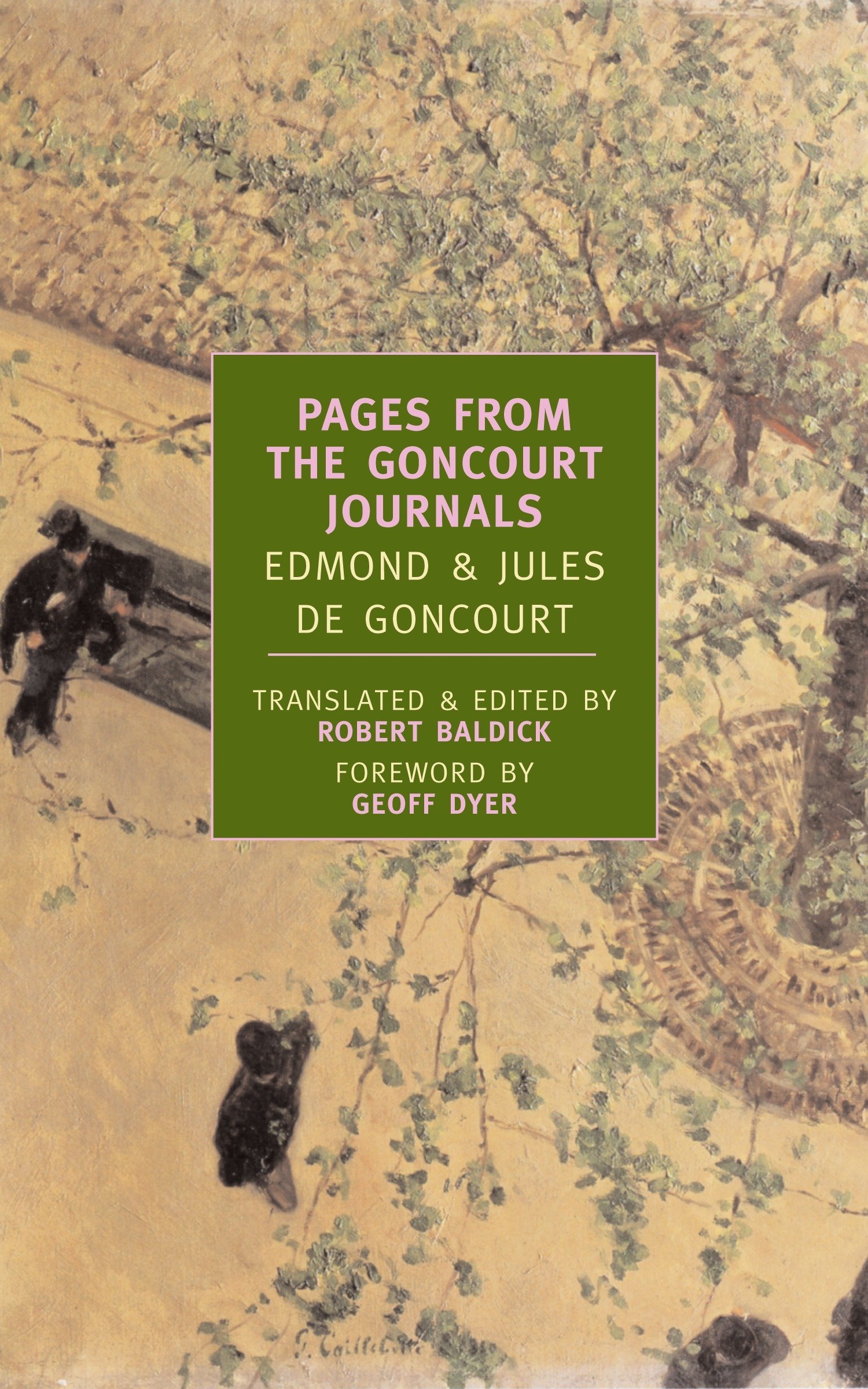


Gerard Genette, "Paul Valery Literature as Such"
Theodor Adorno, "The Valery Proust Museum"
Marcel Proust (1871-1922): Criticism in English
Adorno, Theodor W. "Short Commentaries on Proust." Notes to Literature, edited by Rolf Tiedemann, translated by S.W. Nicholsen, vol. 1, Columbia University Press, 1991, pp. 174-184.
Adorno, Theodor W. "On Proust." Notes to Literature, edited by Rolf Tiedemann, translated by S.W. Nicholsen, vol. 2, Columbia University Press, 1991, pp. 312-317.
Genette, Gérard. "Time and Narrative in A la Recherche du temps perdu." Aspects of Narrative: Selected Papers from the English Institute, edited by J. Hillis Miller, Columbia University Press, 1971, pp. 93-118.
Genette, Gérard. "Proust and Indirect Language." Figures of Literary Discourse, translated by Alan Sheridan, Columbia University Press, 1982, pp. 229-295.
Genette, Gérard. "Proust Palimpsest." Figures of Literary Discourse,translated by Alan Sheridan, Columbia University Press, 1982, pp. 203-228.
Genette, Gérard. "The Proustian Paratexte." Substance, vol. 17, no. 2, 1988, pp. 63-77.
Shattuck, Roger. "Proust's Stilts." Yale French Studies, vol. 34, 1965, pp. 91-98.
Bersani, Leo. "Proust and the Art of Incompletion." Aspects of Narrative: Selected Papers from the English Institute, edited by J. Hillis Miller, Columbia University Press, 1971, pp. 119-142.
Selections rom the website "Proust Criticism in English":
Adorno, Theodor W. "On Proust." Notes to Literature, edited by Rolf Tiedemann, translated by S.W. Nicholsen, vol. 2, Columbia University Press, 1991, pp. 312-317.
Adorno, Theodor W. "Short Commentaries on Proust." Notes to Literature 1, edited by Rolf Tiedemann, translated by S.W.
The pages to In Serch of Lost Time to which Adorno refers in his essay above.
Adorno, Theodor. "Words from Abroad." Notes to Literature 1, edited by Rolf Tiedemann, translated by S.W., an essay on the response he got to "Short Commentaries on Proust" when he delivered it as a radio address.
Barthes, Roland. "Proust and Names." New Critical Essays, translated by Richard Howard, Hill and Wang, 1980, pp. 55-68.
Barthes, Roland. "Longtemps, je me suis couché de bonne heure." The Rustle of Language, translated by Richard Howard, Hill and Wang, 1986, pp. 277-290. In English.
Barthes, Roland et al. "Proust Round Table." Gilles Deleuze, Two Regimes of Madness: Texts and Interviews 1975-1995, translated by G. Lapoujade, Semiotext(e), 2007, pp. 29-60.
Bataille, Georges. "Proust." Literature and Evil, translated by Alastair Hamilton, Marion Boyars, 1985, pp. 133-147.
Benjamin, Walter. "On the Image of Proust," Walter Benjamin Selected Writings Volume 2 Part 1 (Harvard UP), 237-47.
Benjamin, Walter. "On some motifs in Baudelaire" in Walter Benjamin Selected Writings Volume 4 (Harvard UP), pp. 313-55.
Walter Benjamin,The Writer of Modern Life: Essays on Charles Baudelaire
Bersani, Leo. "Proust and the Art of Incompletion." Aspects of Narrative: Selected Papers from the English Institute, edited by J. Hillis Miller, Columbia University Press, 1971, pp. 119-142.
Bersani, Leo. "'The Culture of Redemption': Marcel Proust and Melanie Klein." Critical Inquiry, vol. 12, no. 2, 1986, pp. 399-421.
Blanchot, Maurice. "The Experience of Proust." The Book to Come, edited by Charlotte Mandell, Stanford University Press, 2003, pp. 11-24. (Same title, two different essays)
Blanchot, Maurice. "The Experience of Proust." Faux Pas, translated by Charlotte Mandell, Stanford University Press, 2001, pp. 42-46. (Same title, two different essays)
Hill, Leslie. "Proust and the Art of Reading." Comparative Criticism: A Yearbook, edited by Elinor Shaffer, Cambridge University Press, 1980, pp. 167-185.
Lévinas, Emmanuel. "The Other in Proust." Proper Names, Stanford University Press, 1996, pp. 99-105.
Rivière, Jacques. "Marcel Proust and the Classical Tradition." Critical Essays on Marcel Proust, edited by Barbara J. Bucknall, G.K. Hall & Co., 1987, pp. 25-29.
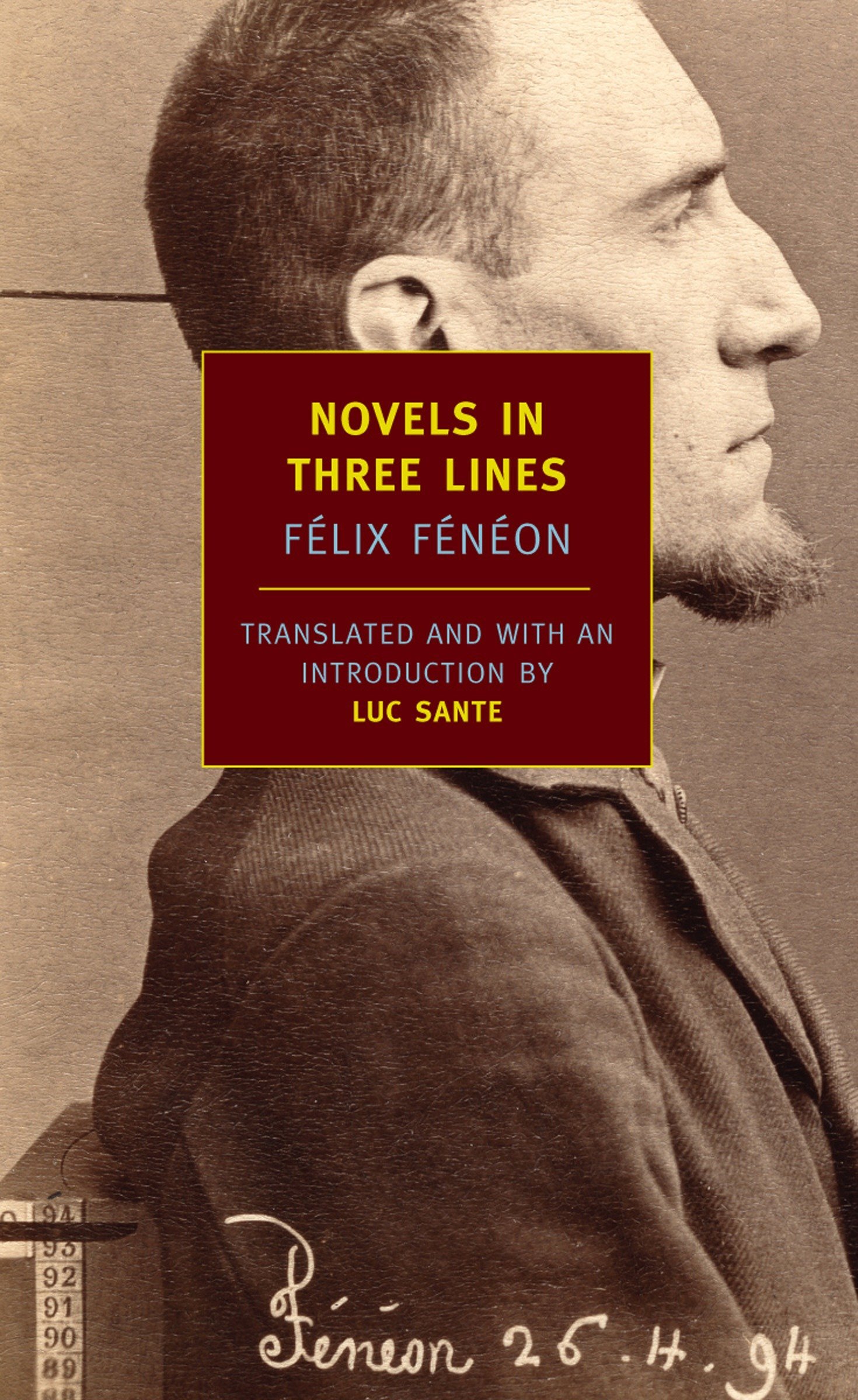
Félix Fénéon, Novels in Three Lines (New York Review Books Classics, 2007)
Athough Gide offers no further explicative commentary on his trébuchement, immediate distaste for Proust’s sentence is typically interpreted as the result of a misreading. The biographer George D. Painter has explained that Gide was “shocked” by what he wrongly considered to be an improper use of language-“a solecism about ‘the vertebrae in her forehead”’- whereas Proust’s use of the word vertebrae was simply a “metonymy” meant to suggest that the ossature of Tante Léonie’s forehead resembled vertebrae. Proust‘s Pléiade editors give a philological gloss on Gide’s putative misreading: It was an incoherency in the typescript that led Gide to believe that the image of vertebrae referred to Tante Léonie’s forehead (rather than to the “armature” of her wig, as it was meant to do).’
--Christine M. Cano, "Mea Culpa: Gide, Proust, and the Nouvelle Revue Française"
OLIVER MUNDAY, "How I Came to Love My Epic Quarantine Reading Project Tackling Proust"
NOVEMBER 1, 2020
The Thrill of Proust's Handwriting | The New Yorker Apr 2, 2013
André Aciman, "Far from Proust’s Way" The New York Review of Books December 15, 2005
André Aciman, "Proust’s Way?" The New York Review of Books December 1, 2005
Lydia Davis, Marcel Muller, Christopher Prendergast, and Jan van Rij, reply by André Aciman, 'Proust's Way?'/ An Exchange | The New York Review of Books April 6, 2006
Roger Shattuck | Proust and the Will | The New York Review of Books 1974
Roger Shattuck | "Kilmartin's Way" | The New York Review of Books
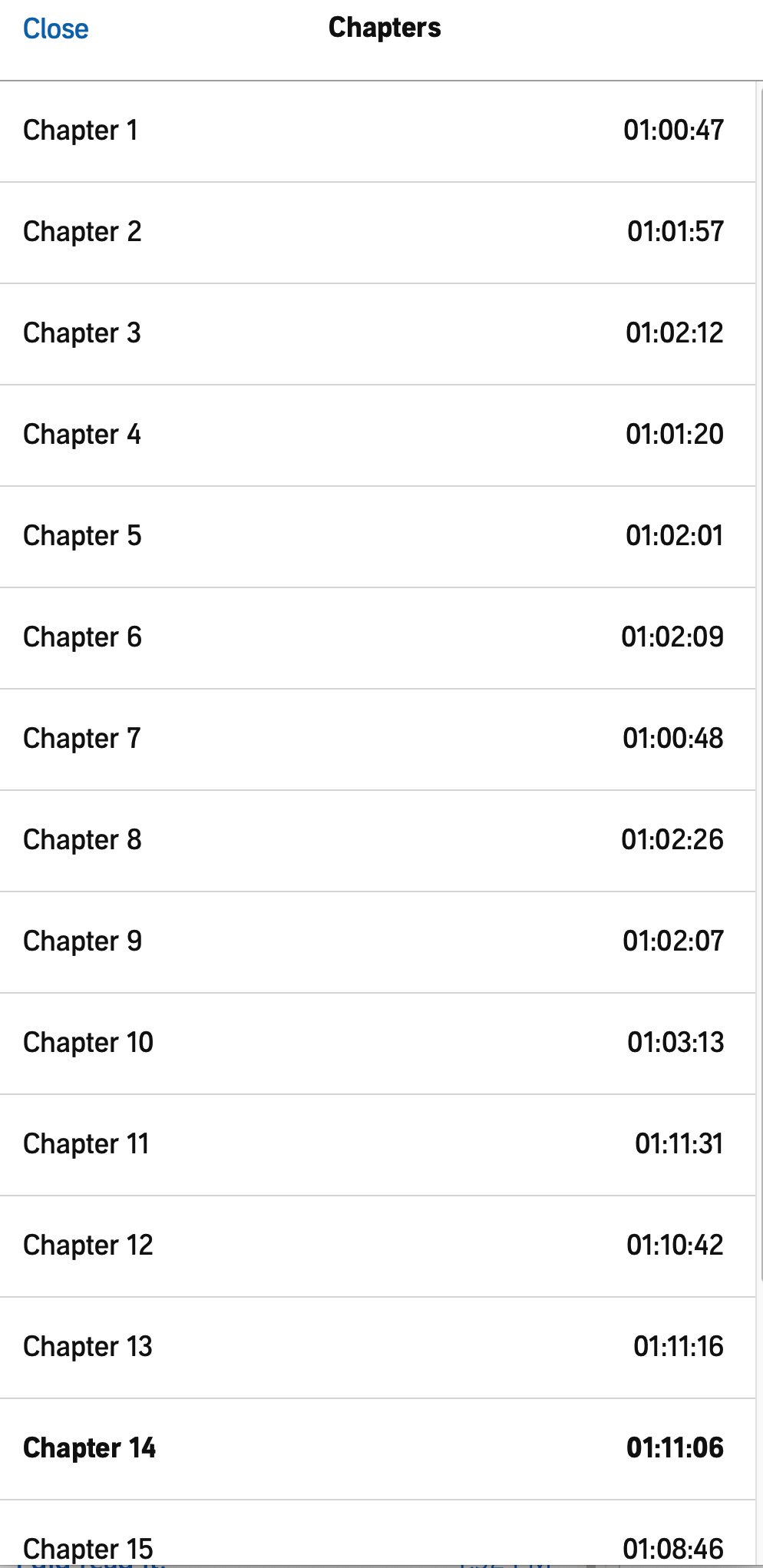
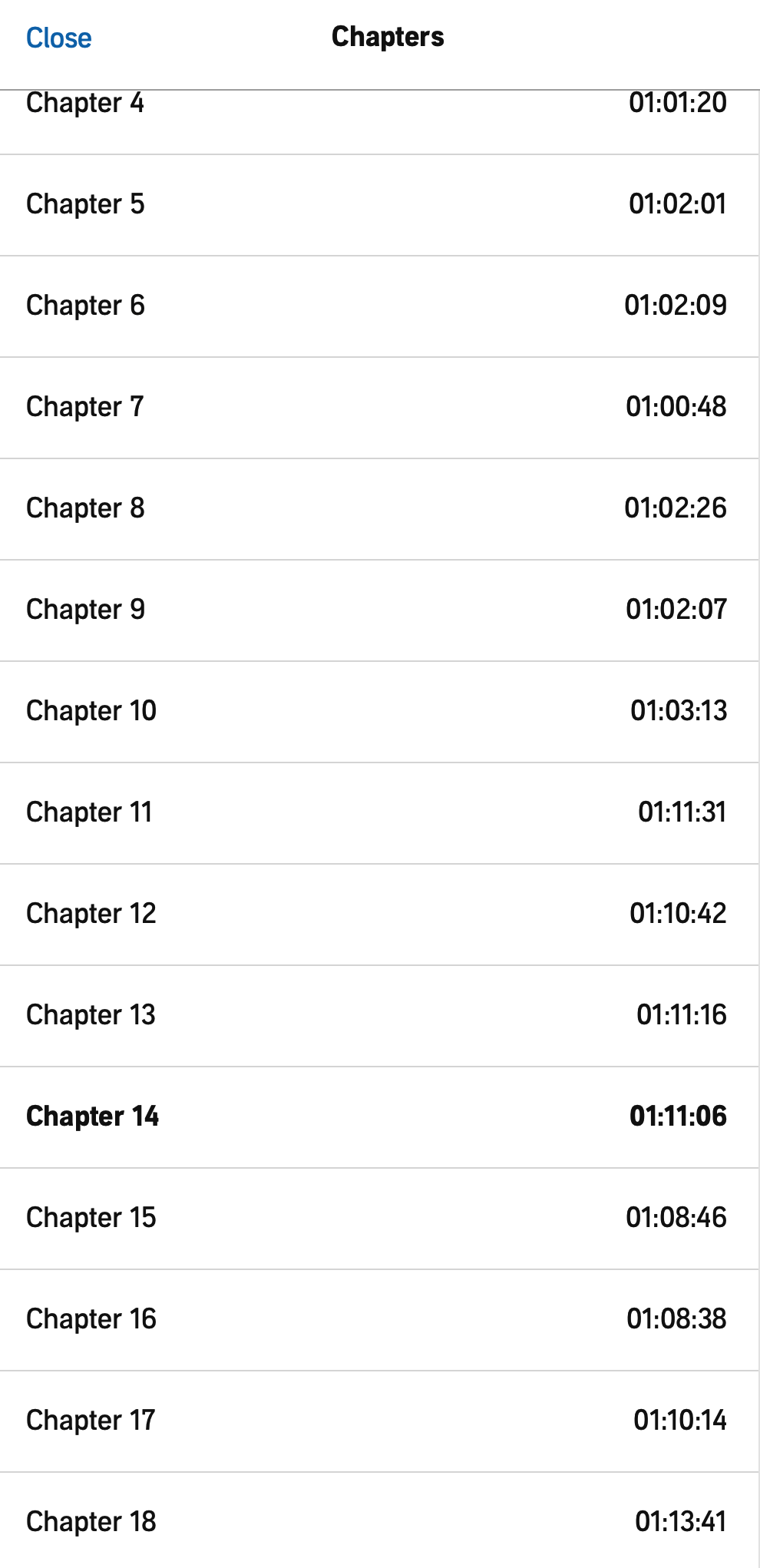
The music on this recording is taken from the NAXOS catalogue: CHABRIER PIANO WORKS, VOL. 1 Georges Rabol, piano
FAURé NOCTURNES NOS. 1–6
Jean Martin, piano
FAURé NOCTURNES NOS.7–13 / PRELUDES, OP.103/ ROMANCES, OP.17
Jean Martin, piano
FAURé PIANO MUSIC FOR FOUR HANDS
Pierre-Alain Volondat, piano; Patrick de Hooge, piano
DAVID PIANO TRIOS NOS. 2 AND 3
Eszter Perenyi, violin; Ilona Prunyi, piano; Tibor Parkanyi, cello
DEBUSSY ARRANGEMENTS FOR 2 PIANOS
Daniel Blumenthal, piano; Robert Groslot, piano
D’INDY PIANO TRIO AND QUINTET / STRING QUARTET NO. 3
Ilona Prunyi, piano; New Budapest Quartet
Novelists sometimes pretend in an introduction that while travelling
in a foreign country they have met somebody who has told them the
story of a person's life. They then withdraw in favour of this casual
acquaintance, and the story that he tells them is nothing more or less than
their novel. Thus the life of Fabrice del Dongo was related to Stendhal by
a Canon of Padua. [Also Abbé Prévost's Manon Lescaut; Denis's Diderot
The Nun; The Arabian Nights / 1,001 Nights] How gladly would we, when
we are in love, that is to say when another person's existence seems to us mysterious, find some
such well-informed narrator! And undoubtedly he exists. Do we not
ourselves frequently relate, without any trace of passion, the story of
some woman or other, to one of our friends, or to a stranger, who has
known nothing of her love-affairs and listens to us with keen interest?
The person that I was when I spoke to Bloch of the Duchesse de Guermantes,
of Mme. Swann, that person still existed, who could have
spoken to me of Albertine, that person exists always… but we never
come across him. It seemed to me that, if I had been able to find women
who had known her, I should have learned everything of which I was
unaware. And yet to strangers it must have seemed that nobody could
have known so much of her life as myself. Did I even know her dearest
friend, Andrée? Thus it is that we suppose that the friend of a Minister
must know the truth about some political affair or cannot be implicated
in a scandal. Having tried and failed, the friend has found that whenever
he discussed politics with the Minister the latter confined himself to
generalisations and told him nothing more than what had already appeared
in the newspapers, or that if he was in any trouble, his repeated attempts
to secure the Minister's help have ended invariably in an: "It is not in my
power" against which the friend is himself powerless. I said to myself: "If
I could have known such and such witnesses!" from whom, if I had
known them, I should probably have been unable to extract anything
more than from Andrée, herself the custodian of a secret which she refused
to surrender. Differing in this respect also from Swann who, when
he was no longer jealous, ceased to feel any curiosity as to what Odette
might have done with Forcheville, even after my jealousy had subsided,
the thought of making the acquaintance of Albertine's laundress, of the
people in her neighbourhood, of reconstructing her life in it, her
intrigues, this alone had any charm for me.
Narrative frame novelist Proust, The Fugitive C K Scott Moncrieff
GRIEG PIANO TRANSCRIPTIONS OF SONGS, OP. 41 / NORDIC MELODIES, OP. 63
Einar Steen-Noleberg, piano
BOELLMANN PIANO QUARTET / PIANO TRIO
Bela Banfalvi, violin; Karoly Botvay, cello; Janos Fehervari, viola; Ilona Prunyi, piano
BRETON PIANO TRIO IN E MAJOR / STRING QUARTET IN D MAJOR
New Budapest Quartet
CIURLIONIS PIANO WORKS, VOL. 1
Muza Rubackyte, piano
CIURLIONIS PIANO WORKS, VOL. 2
Muza Rubackyte, piano
PIERNé FLUTE SONATA / PIANO TRIO
Istvan Matuz, flute; Bela Banfalvi, violin; Norbert Szelecsenyi, piano; Katalin Vass, cello
SINDING PIANO TRIOS NOS. 2 AND 3
Andras Kiss, violin; Tamas Koo, cello; Ilona Prunyi, piano
BORODIN PIANO QUINTET / STRING QUINTET Otto Kertesz, cello; New Budapest Quartet
Music programming by Mike Shah


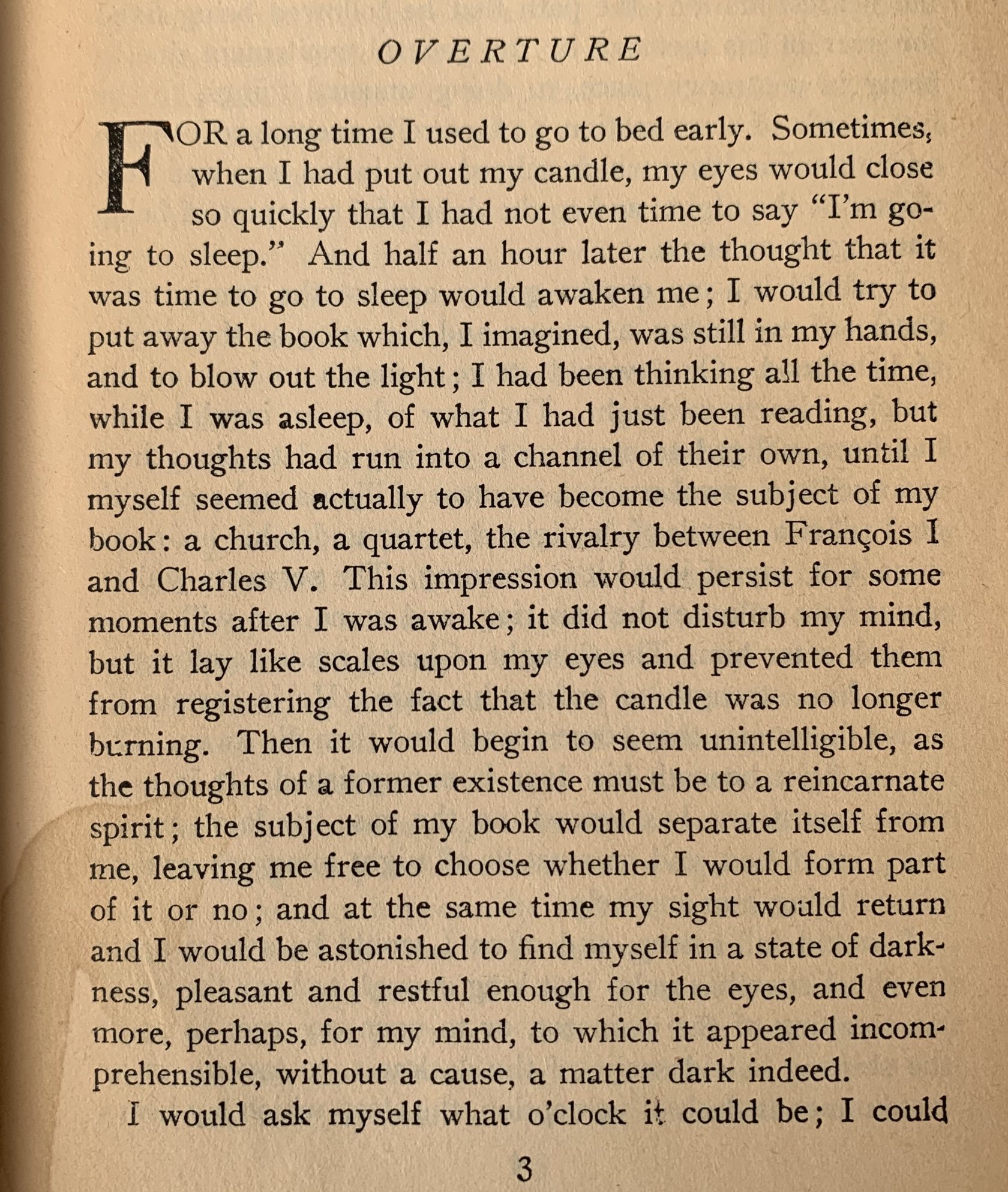
Schubert: Piano Sonata No.20 in A, D.959 - 2. Andantino
I will respond within twenty-four hours or less. Email all work for the course to me at [email protected]
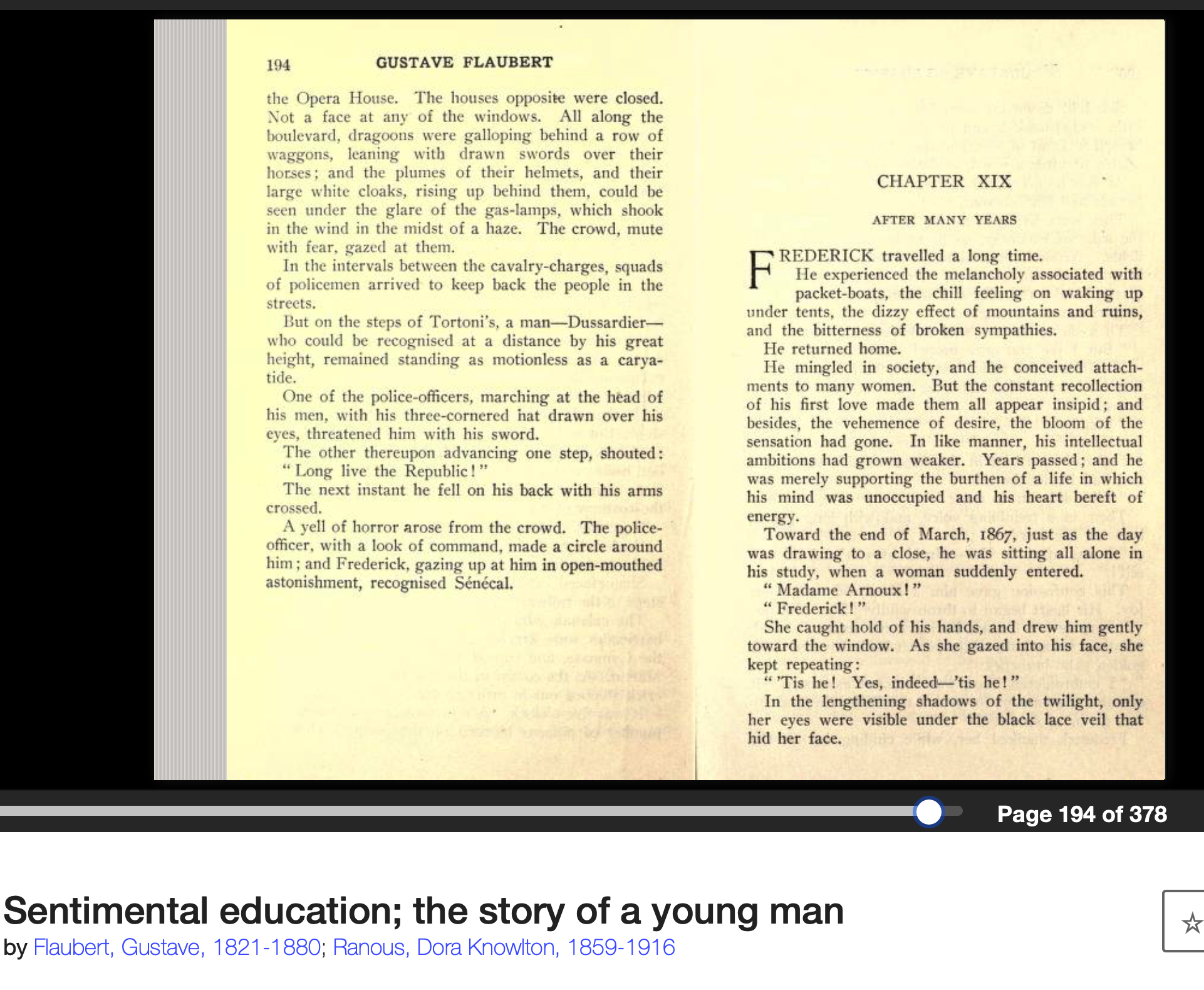
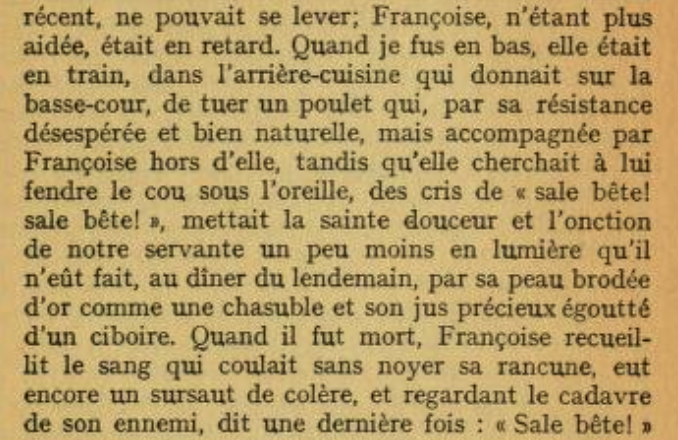
À la recherche du temps perdu (1919) p. 167
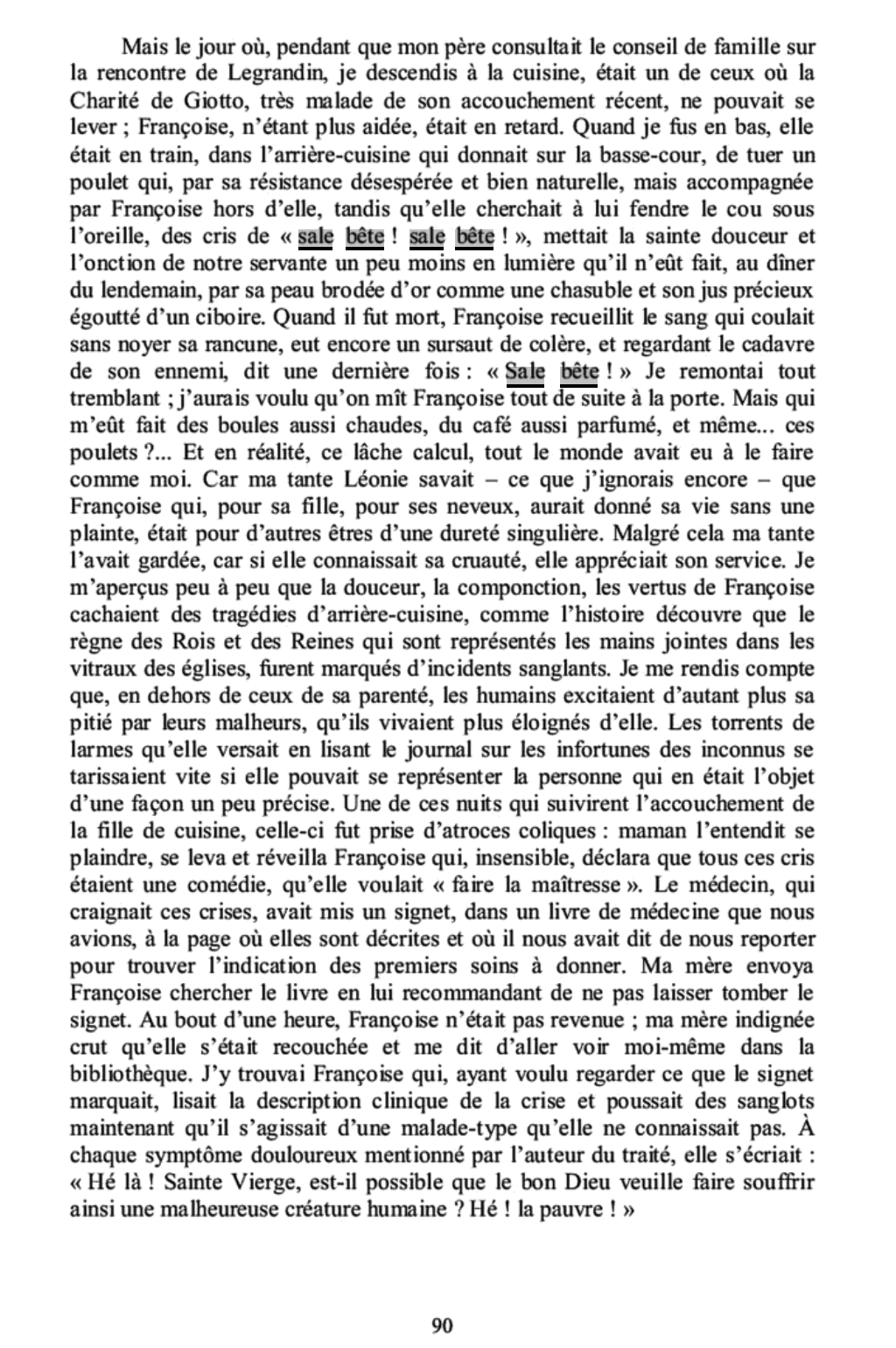

Proust does something similar when the narrator compares Swann's search for Odette in hotels in Chatou to his search for her in bars in Paris after he arrives very late at the Verdurins and discovers she has already left.
Is Proust not trusting his reader's reading memory? If the reader doesn't make the connection, with the narrator revive his memory? Will the remember? If so, will the reader be able to find the earlier passage?
At the Criterion Channel, all women filmmakers are “feminist,” “subversive,” and “radically progressive.”
"I would be glad enough if the book simply served to make people want to read Richardson and argue with my case."
Terry Eagleton, The Rape of Clarissa (1982), viii ("progressive?" [yes]; "feminist"; "genuinely subversive elements")
Martin Herbert, Tell Them I Said No (Sternberg Press, 2016),
goodbye-to-all-that-why-do-artists-reject-the-art-world/
Denunication is not criticism. It is not even thought. It's the herd mentality. You don't have to college to become a keyboard social justice warrior fighting for representation. "Representation" is a bourgeois mirage, an empty-headed concept that has nothing to do with political representation. If no one ever used a racial slur or just plain mean word again, the country would be more uahtoritatrian thanks to authoritarian speech police, not any less racist. If more films are directed by "members" of "oppressed groups" and more people were to watch a film because it was made by a member of an oppressed group, not because it was good, nothing about the country related to health care, minimum wage, equal pay by gender, mass incaeration, the war on drugs, police militarization, and so on, would have changed. You might be able to get a job at the CIA, however.
WOKE CIA recruitment ads (May 2021)
Human rights violations by the CIA
They Live see through glasses scene
Slavoj Zizek on "They Live" (The Pervert's Guide to Ideology)
Vance Packard, Hidden Persuaders
100 Examples of Pareidolia - Seeing Faces in Everyday Objects
The Art of Analogy:
The last shot of North by Northwest (dir. Alfred Hitchcock, 1959), a train entertaining a tunnel Timestamp 1:58
Electric flash at the end of a sex scene montage on a subway late at night in Risky Business (dir. Paul Brickman, 1983)
Version and Variation:
Alas poor Yorick variations in versions of a film with the same title, namely, Hamlet.
Here are two different versions of the same scene from two versions of the same film, namely, The Maltese Falcon. Which one is better? There is only one answer.
Aesthetic Judgment:
"Insofar as the technique and the product lead us to dismiss the losers in the rankings, we are obviously using them to blind ourselves to the future possibilities of those losers and to the fact that hierarchies seldom remain un changed. In the other direction, however, I find it hard to imagine that many of the things that we care about-loving someone as opposed to some other one, preferring this critic to that, even choosing to read this book rather than that-would be possible without comparison. For it is hard to imagine judgments without comparison, as John Barrell suggested when he maintained that Western society since the eighteenth century had made evaluation-the perception of the value of this as opposed to that-the most common of common activities."
--Frances Ferguson
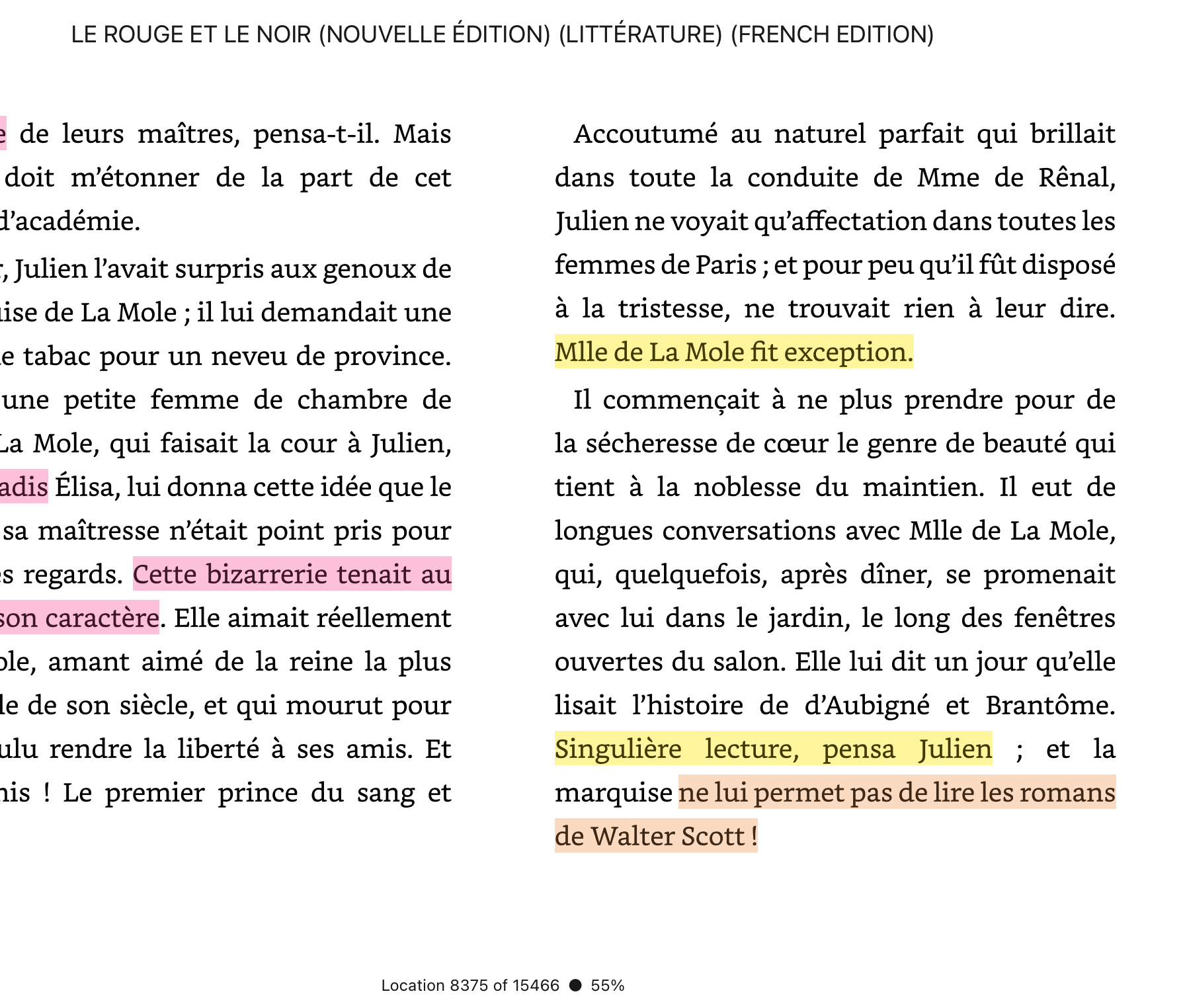

The marquise did not permit her to read the novels of Sir Walter Scott.
Stendhal, The Red and the Black
Ghost Narratives and the Gothic Novel: Print Culture and Reading Addiction
Repetition, AND the LIMITS of RESEMBLANCE: Imitation; Counterfeit; Homage; Caricature Parody; Satire
Conventions and Creativity
Two examples of the same convention--the Hollywood Montage--from two seasons of the same show. Which one is better? There is only one answer.
Montage
Mindhunter Season 1 Episode (dir. David Fincher, 2017)
vs.
Mindhunter Season 2 Episode 8 (dir. Carl Franklin, 2019) Time stamp 37:35
Shot Reverse Shot
One long take of two characters talking to each other framed by standard shot reverse shot intro and exits:
Amazon Prime Patriot 1, Season 8 Episode
Synthesis and Sound Design
Mindhunter (2017; 2019)
Direct Knowledge (Information; Myth; Consensus) vs. Oblique Knowledge ([Deniable] Dissensus; Analogy; Philosophy and Literature)
“A good reader, a major reader, an active and creative reader is a rereader.”
--Vladimir Nabokov
"Happiness has no story."
--Jules Barbey d'Aubervilly
Werner Herzog - Doc / Fest 2019
Neil Young Reveals the Secrets to Hit Records
Flora Cash For Someone - [Official Music Video]
Reading Won't Make You a Better Person
A Classic, You Have to Repeat to Understand time stamp around 23:00
Flora Cash For Someone - [Official Music Video]
Hiroshi Yoshimura – Music For Nine Post Cards (Wave Notation 1) [1982, full album]
La Pléiade: du courant littéraire à la prestigieuse bibliothèque
Robert Darnton, "What Is the History of Books?," Daedalus Vol. 111, No. 3, Representations and Realities (Summer, 1982), pp. 65-83
Robert Darnton, The Case for Books: Past, Present, and Future (2009)
Robert Darnton, "In Defense of the New York Public Library," June 7, 2102
Keith Richards: "There's Two Sides to Every Story" (Part 1)
Keith Richards: "There's Two Sides to Every Story" (Part 2)
Talking of Hitchcock in the spaced-out fourth chapter, where the froth of film and music clips has largely subsided, Mr. Godard says ''we've forgotten why Joan Fontaine leans over the edge of the cliff and what it was that Joel McCrea was going to do in Holland,'' and so on, ''but we remember a handbag, but we remember a bus in the desert, but we remember a glass of milk.''
Turner, "Hannibal Crossing the Alps"
Loop Narrative / Thematic Structure (Visualizing, Spatializing works of art that can only be experienced in time excperienced as a succession of moments.)
Ludovico Einaudi, "Elegy for the Artic" (ends one note short of beginning over)
James Joyce, Finnegans Wake
The Searchers (dir. John Ford, 1956) doorway shots opening and closing
All the President's Men, from typewriter to teletype
Invaders from Mars (film begins over at the end)
Invasion Of The Body Snatchers (1956) - Trailer
Zodiac (dir. David Fincher) sound montage
Mr. Robot Season 2, Episode 6 m4ster-s1ave.aes (sit-com episode)
Classical music in contemporary films. See Liam Niesen dropped off at the train station in The Commuter (dir.
Jaume Collet-Serra, 2018)
Second movement of Beethoven's Ninth in the opening title sequence to Ready or Not (dir.
Matt Bettinelli-OlpinTyler Gillett, 2019) and Tchaikovsky's Overture of 1812 in the butler driving the car sequence.
Kevin Baker, "The Deep State of Dementia" From the September 2019 issue pdf
"Well, first of all, they're all psychopaths."
Mindhunter Season 1, Episode 3 (2017) Timestamp 4:42
Abridge the description below: Cut it down from 468 words to less than forty words:
Herman Melville, Chapter 42 "The Whiteness of the Whale," in Moby Dick.
Though in many natural objects, whiteness refiningly enhances beauty, as if imparting some special virtue of its own, as in marbles, japonicas, and pearls; and though various nations have in some way recognised a certain royal preeminence in this hue; even the barbaric, grand old kings of Pegu placing the title “Lord of the White Elephants” above all their other magniloquent ascriptions of dominion; and the modern kings of Siam unfurling the same snow-white quadruped in the royal standard; and the Hanoverian flag bearing the one figure of a snow-white charger; and the great Austrian Empire, Caesarian, heir to overlording Rome, having for the imperial color the same imperial hue; and though this pre-eminence in it applies to the human race itself, giving the white man ideal mastership over every dusky tribe; and though, besides, all this, whiteness has been even made significant of gladness, for among the Romans a white stone marked a joyful day; and though in other mortal sympathies and symbolizings, this same hue is made the emblem of many touching, noble things- the innocence of brides, the benignity of age; though among the Red Men of America the giving of the white belt of wampum was the deepest pledge of honor; though in many climes, whiteness typifies the majesty of Justice in the ermine of the Judge, and contributes to the daily state of kings and queens drawn by milk-white steeds; though even in the higher mysteries of the most august religions it has been made the symbol of the divine spotlessness and power; by the Persian fire worshippers, the white forked flame being held the holiest on the altar; and in the Greek mythologies, Great Jove himself being made incarnate in a snow-white bull; and though to the noble Iroquois, the midwinter sacrifice of the sacred White Dog was by far the holiest festival of their theology, that spotless, faithful creature being held the purest envoy they could send to the Great Spirit with the annual tidings of their own fidelity; and though directly from the Latin word for white, all Christian priests derive the name of one part of their sacred vesture, the alb or tunic, worn beneath the cassock; and though among the holy pomps of the Romish faith, white is specially employed in the celebration of the Passion of our Lord; though in the Vision of St. John, white robes are given to the redeemed, and the four-and-twenty elders stand clothed in white before the great-white throne, and the Holy One that sitteth there white like wool; yet for all these accumulated associations, with whatever is sweet, and honorable, and sublime, there yet lurks an elusive something in the innermost idea of this hue, which strikes more of panic to the soul than that redness which affrights in blood.
To deal with the horrific events in some of the literature we will read, we will think about trauma in two ways, first as unspeakable and second as a story. Literature can be thought of as a therapeutic resource but not as a solution. It just raises questions.
Changing the Paradigm 2015 Developmental Trauma Panel | Dr. Bessel van der Kolk
A sad outcome:
Btw, don't even think of going to graduate school to get a Ph.D in English--or any other kind of--literature.
Stephen Marche, a survivor of academia, returns to a troubled field"
September Derrida, "Before the Law" in Jacques Derrida (Author), Sandra Van Reenen (Translator) Before the Law: The Complete Text of Préjugés
September Derrida Versions of Derrida's essay / book referenced in Jacques Derrida (Author), Sandra Van Reenen (Translator) Bef
Chomsky on the Watergate scandal and COINTELPRO
"Bring me the Steak Au Poivre" --Orson Welles
"I'm Not Crazy!" Mental Illness on Film (2017)
"The Sceptics, the only honourable type of respect among the ever-so multiply ambiguous tribe of the philosophers!"
--Nietzsche, Ecce Homo: How One Becomes What One Is
The one thing which we seek with insatiable desire is to forget ourselves, to be surprised out of our propriety, to lose our sempiternal memory and to do something without knowing how or why; in short to draw a new circle. Nothing great was ever achieved without enthusiasm. The way of life is wonderful; it is by abandonment. The great moments of history are the facilities of performance through the strength of ideas, as the works of genius and religion. "A man," said Oliver Cromwell, "never rises so high as when he knows not whither he is going." Dreams and drunkenness, the use of opium and alcohol are the semblance and counterfeit of this oracular genius, and hence their dangerous attraction for men. For the like reason they ask the aid of wild passions, as in gaming and war, to ape in some manner these flames and generosities of the heart.
--Ralph Waldo Emerson, Essays, First Series
News on the March (formerly known as "Outburts") Could compare the Russian DVD set to the Criterion Collection edition (2019) blu-ray
Volume 82, 2019/2
Judgment at risk
Cleanth Brooks, "The Heresy of Paraphrase," in The Well Wrought Urn (1947)
To understand how I have planned this course, please be sure to look at John Law, After Method: Mess in Social Science Research Routledge, 2004
PK Feyerabend, Against Method: Outline of an Anarchistic Theory of Knowledge (1975)
Hans-Jörg Rheinberger, "Scrips and Scribbles," MLN, Vol. 118, No. 3, German Issue (Apr., 2003), pp. 622-636.
Russell L. Ackoff, The Art and Science of Mess Management "Interfaces, Vol. 11, No. 1 (Feb., 1981), pp. 20-26
He would enter the drawing-room; and there, while Mme. Verdurin, pointing to the roses which he had sent her that morning, said: “I am furious with you!” and sent him to the place kept for him, by the side of Odette, the pianist would play to them — for their two selves, and for no one else — that little phrase by Vinteuil which was, so to speak, the national anthem of their love. He began, always, with a sustained tremolo from the violin part, which, for several bars, was unaccompanied, and filled all the foreground; until suddenly it seemed to be drawn aside, and — just as in those interiors by Pieter de Hooch, where the subject is set back a long way through the narrow framework of a half-opened door — infinitely remote, in colour quite different, velvety with the radiance of some intervening light, the little phrase appeared, dancing, pastoral, interpolated, episodic, belonging to another world. It passed, with simple and immortal movements, scattering on every side the bounties of its grace, smiling ineffably still; but Swann thought that he could now discern in it some disenchantment. It seemed to be aware how vain, how hollow was the happiness to which it shewed the way. In its airy grace there was, indeed, something definitely achieved, and complete in itself, like the mood of philosophic detachment which follows an outburst of vain regret. But little did that matter to him; he looked upon the sonata less in its own light — as what it might express, had, in fact, expressed to a certain musician, ignorant that any Swann or Odette, anywhere in the world, existed, when he composed it, and would express to all those who should hear it played in centuries to come — than as a pledge, a token of his love, which made even the Verdurins and their little pianist think of Odette and, at the same time, of himself — which bound her to him by a lasting tie; and at that point he had (whimsically entreated by Odette) abandoned the idea of getting some ‘professional’ to play over to him the whole sonata, of which he still knew no more than this one passage. “Why do you want the rest?” she had asked him. “Our little bit; that’s all we need.” He went farther; agonised by the reflection, at the moment when it passed by him, so near and yet so infinitely remote, that, while it was addressed to their ears, it knew them not, he would regret, almost, that it had a meaning of its own, an intrinsic and unalterable beauty, foreign to themselves, just as in the jewels given to us, or even in the letters written to us by a woman with whom we are in love, we find fault with the ‘water’ of a stone, or with the words of a sentence because they are not fashioned exclusively from the spirit of a fleeting intimacy and of a ‘lass unparalleled.’
Cybertopia - Dreams of Silicon Valley - Docu - 2015
Lorsqu'il écrit enfin, le narrateur, dans le Temps Retrouvé, écrit sous le signe du renoncement :
"Moi, c'était autre chose que j'avais d'écrire, de plus long et pour plus d'une personne. Long à écrire. (..) Non pas que je prétendisse refaire, en quoi que ce fût, les Mille et une Nuits, pas plus que les Mémoires de Saint-Simon écrits eux aussi la nuit, pas plus qu'aucun des livres que j'avais aimés, dans ma naïveté d'enfant, superstitieusement attachée à eux comme à mes amours, ne pouvant pas sans horreur imaginer une oeuvre qui serait différente d'eux. Mais comme Elstir Chardin, on ne peut refaire ce qu'on aime qu'en le renonçant." (t. III page 1043).
Maurice Domino, Devenir Marcel Proust... ou la r éférence en représentation
But at other times, instead of going to a farm, we would climb to the highest
point of the cliff, and, when we had reached it and were seated on the grass,
would undo our parcel of sandwiches and cakes. My friends preferred the
sandwiches, and were surprised to see me eat only a single chocolate cake,
sugared with gothic tracery, or an apricot tart. This was because, with the
sandwiches of cheese or of green-stuff, a form of food that was novel to me and
knew nothing of the past, I had nothing in common. But the cakes understood,
the tarts were gossips. There were in the former an insipid taste of cream, in the
latter a fresh taste of fruit which knew all about Combray, and about Gilberte,
not only the Gilberte of Combray but her too of Paris, at whose tea-parties I had
found them again. They reminded me of those cake-plates of the Arabian Nights
pattern, the subjects on which were such a distraction to my aunt Leonie when
Françoise brought her up, one day, Aladdin or the Wonderful Lamp, another day
Ali-Baba, or the Sleeper Awakes, or Sinbad the Sailor embarking at Bassorah
with all his treasure. I should dearly have liked to see them again, but my
grandmother did not know what had become of them, and thought moreover that
they were just common plates that had been bought in the village. No matter, in
that grey, midland Combray scene they and their pictures were set like many-
coloured jewels, as in the dark church were the windows with their shifting
radiance, as in the dusk of my bedroom were the projections cast by the magic-
lantern, as in the foreground of the view of the railway-station and the little local
line the buttercups from the Indies and the Persian lilacs, as were my great-aunt’s
shelves of old porcelain in the sombre dwelling of an elderly lady in a country
town.
In the Shadow of Young Girls in Flower